|
SNAP Library 6.0, Developer Reference
2020-12-09 16:24:20
SNAP, a general purpose, high performance system for analysis and manipulation of large networks
|
|
SNAP Library 6.0, Developer Reference
2020-12-09 16:24:20
SNAP, a general purpose, high performance system for analysis and manipulation of large networks
|
#include <unicode.h>
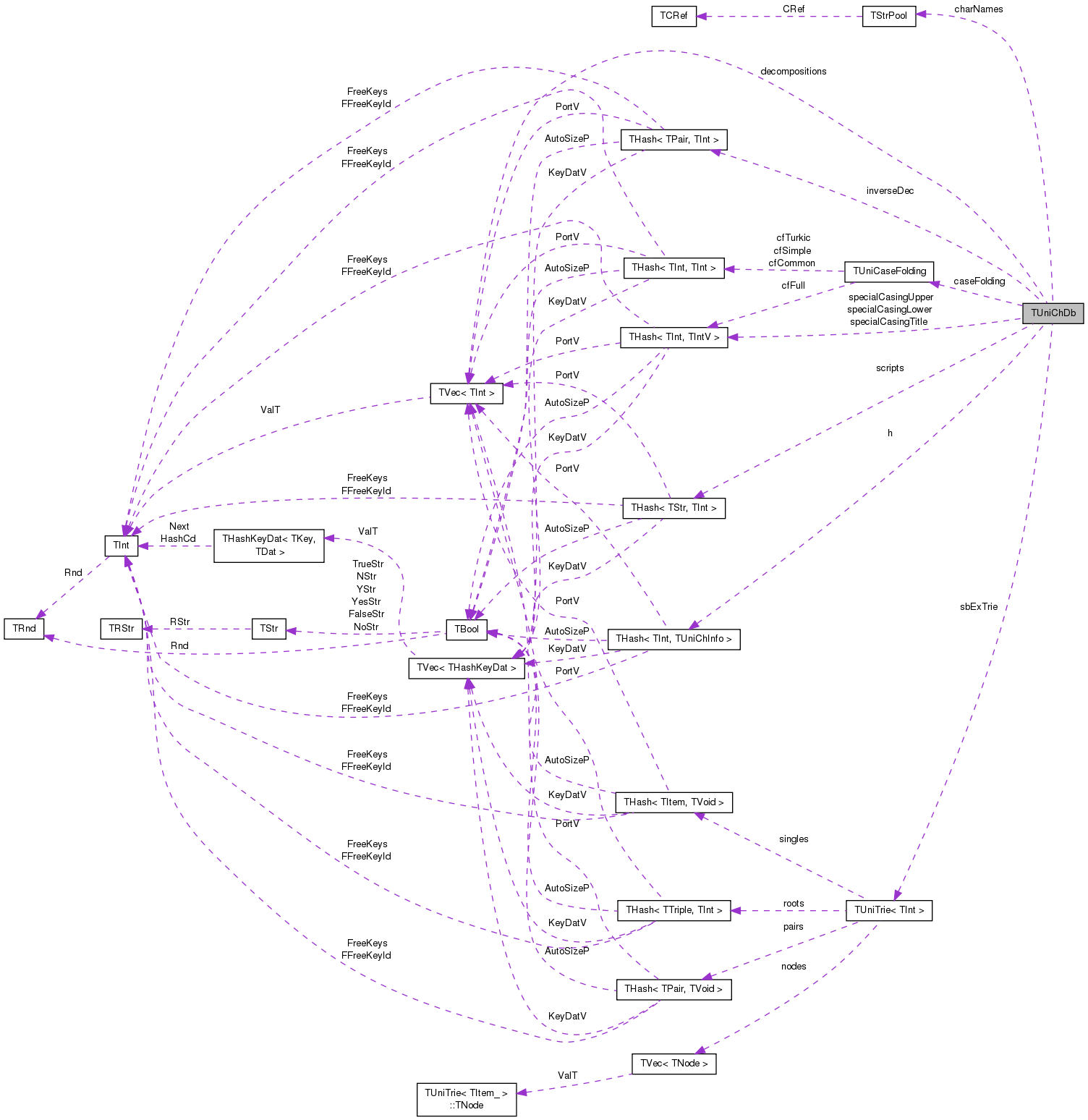
Classes | |
| class | TSubcatHelper |
| class | TUcdFileReader |
Public Types | |
| enum | { HangulSBase = 0xAC00, HangulLBase = 0x1100, HangulVBase = 0x1161, HangulTBase = 0x11A7, HangulLCount = 19, HangulVCount = 21, HangulTCount = 28, HangulNCount = HangulVCount * HangulTCount, HangulSCount = HangulLCount * HangulNCount } |
| enum | TCaseConversion_ { ccLower = 0, ccUpper = 1, ccTitle = 2, ccMax = 3 } |
| typedef enum TUniChDb::TCaseConversion_ | TCaseConversion |
Public Member Functions | |
| TUniChDb () | |
| TUniChDb (TSIn &SIn) | |
| void | Clr () |
| void | Save (TSOut &SOut) const |
| void | Load (TSIn &SIn) |
| void | LoadBin (const TStr &fnBin) |
| void | Test (const TStr &basePath) |
| const TStr & | GetScriptName (const int scriptId) const |
| int | GetScriptByName (const TStr &scriptName) const |
| int | GetScript (const TUniChInfo &ci) const |
| int | GetScript (const int cp) const |
| const char * | GetCharName (const int cp) const |
| TStr | GetCharNameS (const int cp) const |
| template<class TSrcVec > | |
| void | PrintCharNames (FILE *f, const TSrcVec &src, size_t srcIdx, const size_t srcCount, const TStr &prefix) const |
| template<class TSrcVec > | |
| void | PrintCharNames (FILE *f, const TSrcVec &src, const TStr &prefix) const |
| bool | IsGetChInfo (const int cp, TUniChInfo &ChInfo) |
| TUniChCategory | GetCat (const int cp) const |
| TUniChSubCategory | GetSubCat (const int cp) const |
| bool | IsWbFlag (const int cp, const TUniChFlags flag) const |
| int | GetWbFlags (const int cp) const |
| bool | IsSbFlag (const int cp, const TUniChFlags flag) const |
| int | GetSbFlags (const int cp) const |
| DECLARE_FORWARDED_PROPERTY_METHODS bool | IsPrivateUse (const int cp) const |
| bool | IsSurrogate (const int cp) const |
| int | GetCombiningClass (const int cp) const |
| template<typename TSrcVec > | |
| bool | FindNextWordBoundary (const TSrcVec &src, const size_t srcIdx, const size_t srcCount, size_t &position) const |
| template<typename TSrcVec > | |
| void | FindWordBoundaries (const TSrcVec &src, const size_t srcIdx, const size_t srcCount, TBoolV &dest) const |
| template<typename TSrcVec > | |
| bool | FindNextSentenceBoundary (const TSrcVec &src, const size_t srcIdx, const size_t srcCount, size_t &position) const |
| template<typename TSrcVec > | |
| void | FindSentenceBoundaries (const TSrcVec &src, const size_t srcIdx, const size_t srcCount, TBoolV &dest) const |
| void | SbEx_Clr () |
| template<class TSrcVec > | |
| void | SbEx_Add (const TSrcVec &v) |
| void | SbEx_Add (const TStr &s) |
| void | SbEx_AddUtf8 (const TStr &s) |
| int | SbEx_AddMulti (const TStr &words, const bool wordsAreUtf8=true) |
| void | SbEx_Set (const TUniTrie< TInt > &newTrie) |
| int | SbEx_SetStdEnglish () |
| template<typename TSrcVec , typename TDestCh > | |
| void | Decompose (const TSrcVec &src, size_t srcIdx, const size_t srcCount, TVec< TDestCh > &dest, bool compatibility, bool clrDest=true) const |
| template<typename TSrcVec , typename TDestCh > | |
| void | Decompose (const TSrcVec &src, TVec< TDestCh > &dest, bool compatibility, bool clrDest=true) const |
| template<typename TSrcVec , typename TDestCh > | |
| void | Compose (const TSrcVec &src, size_t srcIdx, const size_t srcCount, TVec< TDestCh > &dest, bool clrDest=true) const |
| template<typename TSrcVec , typename TDestCh > | |
| void | Compose (const TSrcVec &src, TVec< TDestCh > &dest, bool clrDest=true) const |
| template<typename TSrcVec , typename TDestCh > | |
| void | DecomposeAndCompose (const TSrcVec &src, size_t srcIdx, const size_t srcCount, TVec< TDestCh > &dest, bool compatibility, bool clrDest=true) const |
| template<typename TSrcVec , typename TDestCh > | |
| void | DecomposeAndCompose (const TSrcVec &src, TVec< TDestCh > &dest, bool compatibility, bool clrDest=true) const |
| template<typename TSrcVec , typename TDestCh > | |
| size_t | ExtractStarters (const TSrcVec &src, size_t srcIdx, const size_t srcCount, TVec< TDestCh > &dest, bool clrDest=true) const |
| template<typename TSrcVec , typename TDestCh > | |
| size_t | ExtractStarters (const TSrcVec &src, TVec< TDestCh > &dest, bool clrDest=true) const |
| template<typename TSrcVec > | |
| size_t | ExtractStarters (TSrcVec &src) const |
| void | LoadTxt (const TStr &basePath) |
| void | SaveBin (const TStr &fnBinUcd) |
| template<typename TSrcVec , typename TDestCh > | |
| void | GetCaseConverted (const TSrcVec &src, size_t srcIdx, const size_t srcCount, TVec< TDestCh > &dest, const bool clrDest, const TCaseConversion how, const bool turkic, const bool lithuanian) const |
| template<typename TSrcVec , typename TDestCh > | |
| void | GetLowerCase (const TSrcVec &src, size_t srcIdx, const size_t srcCount, TVec< TDestCh > &dest, const bool clrDest=true, const bool turkic=false, const bool lithuanian=false) const |
| template<typename TSrcVec , typename TDestCh > | |
| void | GetUpperCase (const TSrcVec &src, size_t srcIdx, const size_t srcCount, TVec< TDestCh > &dest, const bool clrDest=true, const bool turkic=false, const bool lithuanian=false) const |
| template<typename TSrcVec , typename TDestCh > | |
| void | GetTitleCase (const TSrcVec &src, size_t srcIdx, const size_t srcCount, TVec< TDestCh > &dest, const bool clrDest=true, const bool turkic=false, const bool lithuanian=false) const |
| template<typename TSrcVec , typename TDestCh > | |
| void | GetLowerCase (const TSrcVec &src, TVec< TDestCh > &dest, const bool clrDest=true, const bool turkic=false, const bool lithuanian=false) const |
| template<typename TSrcVec , typename TDestCh > | |
| void | GetUpperCase (const TSrcVec &src, TVec< TDestCh > &dest, const bool clrDest=true, const bool turkic=false, const bool lithuanian=false) const |
| template<typename TSrcVec , typename TDestCh > | |
| void | GetTitleCase (const TSrcVec &src, TVec< TDestCh > &dest, const bool clrDest=true, const bool turkic=false, const bool lithuanian=false) const |
| template<typename TSrcVec , typename TDestCh > | |
| void | GetSimpleCaseConverted (const TSrcVec &src, size_t srcIdx, const size_t srcCount, TVec< TDestCh > &dest, const bool clrDest, const TCaseConversion how) const |
| template<typename TSrcVec , typename TDestCh > | |
| void | GetSimpleLowerCase (const TSrcVec &src, size_t srcIdx, const size_t srcCount, TVec< TDestCh > &dest, const bool clrDest=true) const |
| template<typename TSrcVec , typename TDestCh > | |
| void | GetSimpleUpperCase (const TSrcVec &src, size_t srcIdx, const size_t srcCount, TVec< TDestCh > &dest, const bool clrDest=true) const |
| template<typename TSrcVec , typename TDestCh > | |
| void | GetSimpleTitleCase (const TSrcVec &src, size_t srcIdx, const size_t srcCount, TVec< TDestCh > &dest, const bool clrDest=true) const |
| template<typename TSrcVec , typename TDestCh > | |
| void | GetSimpleLowerCase (const TSrcVec &src, TVec< TDestCh > &dest, const bool clrDest=true) const |
| template<typename TSrcVec , typename TDestCh > | |
| void | GetSimpleUpperCase (const TSrcVec &src, TVec< TDestCh > &dest, const bool clrDest=true) const |
| template<typename TSrcVec , typename TDestCh > | |
| void | GetSimpleTitleCase (const TSrcVec &src, TVec< TDestCh > &dest, const bool clrDest=true) const |
| template<typename TSrcVec > | |
| void | ToSimpleCaseConverted (TSrcVec &src, size_t srcIdx, const size_t srcCount, const TCaseConversion how) const |
| template<typename TSrcVec > | |
| void | ToSimpleUpperCase (TSrcVec &src, size_t srcIdx, const size_t srcCount) const |
| template<typename TSrcVec > | |
| void | ToSimpleLowerCase (TSrcVec &src, size_t srcIdx, const size_t srcCount) const |
| template<typename TSrcVec > | |
| void | ToSimpleTitleCase (TSrcVec &src, size_t srcIdx, const size_t srcCount) const |
| template<typename TSrcVec > | |
| void | ToSimpleUpperCase (TSrcVec &src) const |
| template<typename TSrcVec > | |
| void | ToSimpleLowerCase (TSrcVec &src) const |
| template<typename TSrcVec > | |
| void | ToSimpleTitleCase (TSrcVec &src) const |
| template<typename TSrcVec , typename TDestCh > | |
| void | GetCaseFolded (const TSrcVec &src, size_t srcIdx, const size_t srcCount, TVec< TDestCh > &dest, const bool clrDest, const bool full, const bool turkic=false) const |
| template<typename TSrcVec , typename TDestCh > | |
| void | GetCaseFolded (const TSrcVec &src, TVec< TDestCh > &dest, const bool clrDest=true, const bool full=true, const bool turkic=false) const |
| template<typename TSrcVec > | |
| void | ToCaseFolded (TSrcVec &src, size_t srcIdx, const size_t srcCount, const bool turkic=false) const |
| template<typename TSrcVec > | |
| void | ToCaseFolded (TSrcVec &src, const bool turkic=false) const |
Static Public Member Functions | |
| static TStr | GetCaseFoldingFn () |
| static TStr | GetSpecialCasingFn () |
| static TStr | GetUnicodeDataFn () |
| static TStr | GetCompositionExclusionsFn () |
| static TStr | GetScriptsFn () |
| static TStr | GetDerivedCorePropsFn () |
| static TStr | GetLineBreakFn () |
| static TStr | GetPropListFn () |
| static TStr | GetAuxiliaryDir () |
| static TStr | GetWordBreakTestFn () |
| static TStr | GetWordBreakPropertyFn () |
| static TStr | GetSentenceBreakTestFn () |
| static TStr | GetSentenceBreakPropertyFn () |
| static TStr | GetNormalizationTestFn () |
| static TStr | GetBinFn () |
| static TStr | GetScriptNameUnknown () |
| static TStr | GetScriptNameKatakana () |
| static TStr | GetScriptNameHiragana () |
Protected Types | |
| typedef TUniVecIdx | TVecIdx |
Protected Member Functions | |
| void | InitAfterLoad () |
| bool | IsWbIgnored (const int cp) const |
| template<typename TSrcVec > | |
| void | WbFindCurOrNextNonIgnored (const TSrcVec &src, size_t &position, const size_t srcEnd) const |
| template<typename TSrcVec > | |
| void | WbFindNextNonIgnored (const TSrcVec &src, size_t &position, const size_t srcEnd) const |
| template<typename TSrcVec > | |
| void | WbFindNextNonIgnoredS (const TSrcVec &src, size_t &position, const size_t srcEnd) const |
| template<typename TSrcVec > | |
| bool | WbFindPrevNonIgnored (const TSrcVec &src, const size_t srcStart, size_t &position) const |
| void | TestWbFindNonIgnored (const TIntV &src) const |
| void | TestWbFindNonIgnored () const |
| void | TestFindNextWordOrSentenceBoundary (const TStr &basePath, bool sentence) |
| template<typename TSrcVec > | |
| bool | CanSentenceEndHere (const TSrcVec &src, const size_t srcIdx, const size_t position) const |
| template<typename TDestCh > | |
| void | AddDecomposition (const int codePoint, TVec< TDestCh > &dest, const bool compatibility) const |
| void | TestComposition (const TStr &basePath) |
| void | InitWordAndSentenceBoundaryFlags (const TStr &basePath) |
| void | InitScripts (const TStr &basePath) |
| void | InitLineBreaks (const TStr &basePath) |
| void | InitDerivedCoreProperties (const TStr &basePath) |
| void | InitPropList (const TStr &basePath) |
| void | InitSpecialCasing (const TStr &basePath) |
| void | LoadTxt_ProcessDecomposition (TUniChInfo &ci, TStr s) |
| void | TestCaseConversion (const TStr &source, const TStr &trueLc, const TStr &trueTc, const TStr &trueUc, bool turkic, bool lithuanian) |
| void | TestCaseConversions () |
Static Protected Member Functions | |
| static bool | IsWbIgnored (const TUniChInfo &ci) |
Protected Attributes | |
| TUniTrie< TInt > | sbExTrie |
Friends | |
| class | TUniCaseFolding |
| typedef enum TUniChDb::TCaseConversion_ TUniChDb::TCaseConversion |
|
protected |
| anonymous enum |
| Enumerator | |
|---|---|
| HangulSBase | |
| HangulLBase | |
| HangulVBase | |
| HangulTBase | |
| HangulLCount | |
| HangulVCount | |
| HangulTCount | |
| HangulNCount | |
| HangulSCount | |
Definition at line 1405 of file unicode.h.
| Enumerator | |
|---|---|
| ccLower | |
| ccUpper | |
| ccTitle | |
| ccMax | |
Definition at line 1584 of file unicode.h.
|
inline |
|
inlineexplicit |
|
protected |
Definition at line 3103 of file unicode.h.
References TVec< TVal, TSizeTy >::Add(), TUniChInfo::decompOffset, decompositions, THash< TKey, TDat, THashFunc >::GetKeyId(), h, HangulLBase, HangulNCount, HangulSBase, HangulSCount, HangulTBase, HangulTCount, HangulVBase, and TUniChInfo::IsCompatibilityDecomposition().
Referenced by Decompose().
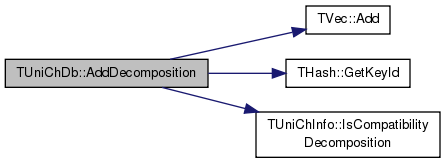

|
protected |
Definition at line 2585 of file unicode.h.
References TUniTrie< TItem_ >::Empty(), TUniTrie< TItem_ >::Get3GramRoot(), GetCat(), TUniTrie< TItem_ >::GetChild(), GetSbFlags(), TUniTrie< TItem_ >::Has1Gram(), TUniTrie< TItem_ >::Has2Gram(), IAssert, TUniTrie< TItem_ >::IsNodeTerminal(), sbExTrie, ucfSbATerm, ucfSbSep, ucfSbSp, ucfSbSTerm, and WbFindPrevNonIgnored().
Referenced by FindNextSentenceBoundary().
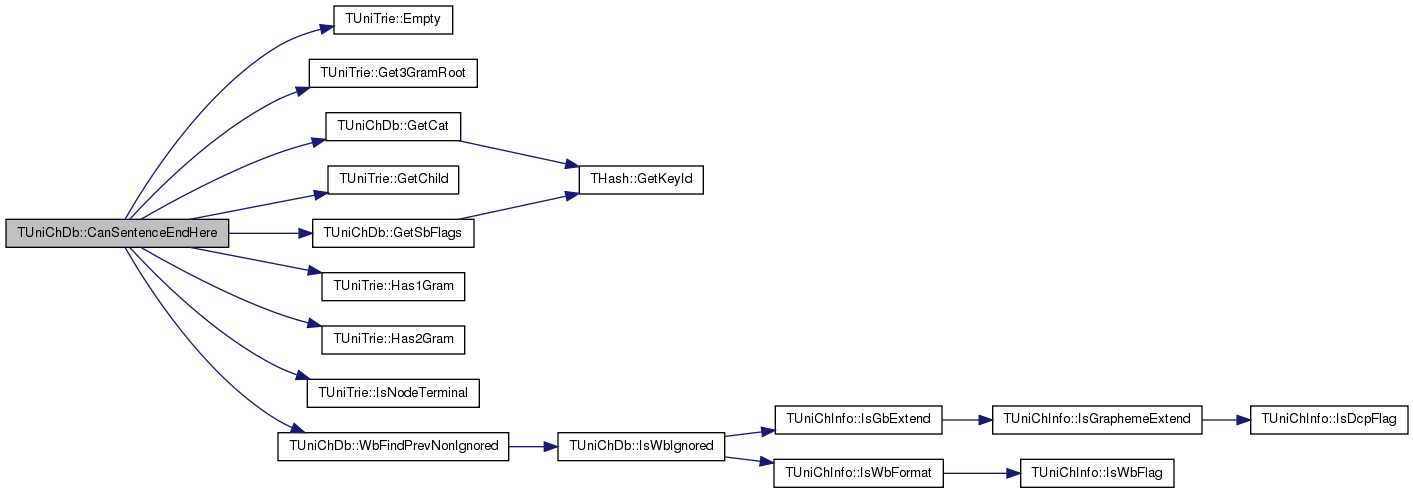

|
inline |
Definition at line 1276 of file unicode.h.
References THash< TKey, TDat, THashFunc >::Clr(), TUniCaseFolding::Clr(), TVec< TVal, TSizeTy >::Clr(), and TStrPool::Clr().
Referenced by LoadTxt().
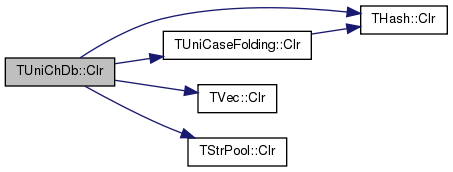

| void TUniChDb::Compose | ( | const TSrcVec & | src, |
| size_t | srcIdx, | ||
| const size_t | srcCount, | ||
| TVec< TDestCh > & | dest, | ||
| bool | clrDest = true |
||
| ) | const |
Definition at line 3158 of file unicode.h.
References TVec< TVal, TSizeTy >::Add(), Assert, ccMax, TUniChInfo::ccStarter, TVec< TVal, TSizeTy >::Clr(), GetCombiningClass(), THash< TKey, TDat, THashFunc >::GetKeyId(), HangulLBase, HangulLCount, HangulSBase, HangulSCount, HangulTBase, HangulTCount, HangulVBase, HangulVCount, inverseDec, and TVec< TVal, TSizeTy >::Len().
Referenced by Compose(), TUnicode::Compose(), and DecomposeAndCompose().
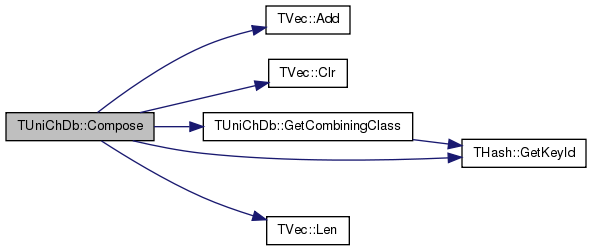

|
inline |
Definition at line 1532 of file unicode.h.
References Compose().

| void TUniChDb::Decompose | ( | const TSrcVec & | src, |
| size_t | srcIdx, | ||
| const size_t | srcCount, | ||
| TVec< TDestCh > & | dest, | ||
| bool | compatibility, | ||
| bool | clrDest = true |
||
| ) | const |
Definition at line 3126 of file unicode.h.
References AddDecomposition(), TUniChInfo::ccStarter, TVec< TVal, TSizeTy >::Clr(), GetCombiningClass(), and TVec< TVal, TSizeTy >::Len().
Referenced by Decompose(), TUnicode::Decompose(), and DecomposeAndCompose().
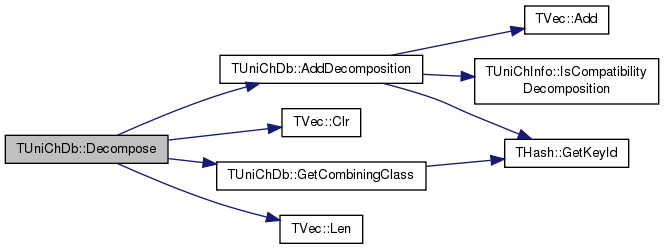
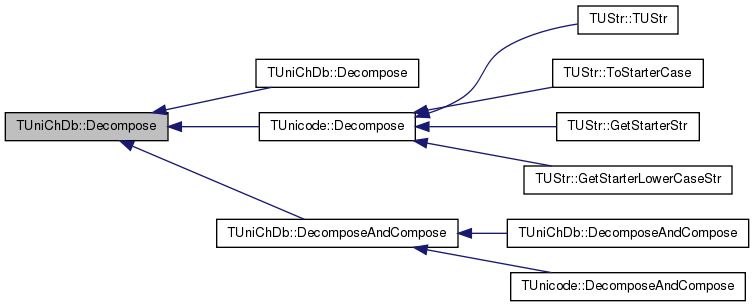
|
inline |
Definition at line 1520 of file unicode.h.
References Decompose().

| void TUniChDb::DecomposeAndCompose | ( | const TSrcVec & | src, |
| size_t | srcIdx, | ||
| const size_t | srcCount, | ||
| TVec< TDestCh > & | dest, | ||
| bool | compatibility, | ||
| bool | clrDest = true |
||
| ) | const |
Definition at line 3148 of file unicode.h.
References TVec< TVal, TSizeTy >::Clr(), Compose(), Decompose(), and TVec< TVal, TSizeTy >::Len().
Referenced by DecomposeAndCompose(), and TUnicode::DecomposeAndCompose().


|
inline |
Definition at line 1542 of file unicode.h.
References DecomposeAndCompose().

| size_t TUniChDb::ExtractStarters | ( | const TSrcVec & | src, |
| size_t | srcIdx, | ||
| const size_t | srcCount, | ||
| TVec< TDestCh > & | dest, | ||
| bool | clrDest = true |
||
| ) | const |
Definition at line 3215 of file unicode.h.
References TVec< TVal, TSizeTy >::Add(), TUniChInfo::ccStarter, TVec< TVal, TSizeTy >::Clr(), and GetCombiningClass().
Referenced by ExtractStarters(), and TUnicode::ExtractStarters().


|
inline |
Definition at line 1551 of file unicode.h.
References ExtractStarters().

|
inline |
Definition at line 1555 of file unicode.h.
References ExtractStarters(), and TVec< TVal, TSizeTy >::Len().

| bool TUniChDb::FindNextSentenceBoundary | ( | const TSrcVec & | src, |
| const size_t | srcIdx, | ||
| const size_t | srcCount, | ||
| size_t & | position | ||
| ) | const |
Definition at line 2636 of file unicode.h.
References CanSentenceEndHere(), GetSbFlags(), IAssert, IsPeekAheadSkippable, IsWbIgnored(), TestCurNext, TestPrevCurNext, Trans, ucfSbATerm, ucfSbClose, ucfSbLower, ucfSbNumeric, ucfSbSep, ucfSbSp, ucfSbSTerm, ucfSbUpper, WbFindNextNonIgnored(), and WbFindPrevNonIgnored().
Referenced by TUnicode::FindNextSentenceBoundary(), FindSentenceBoundaries(), and TestFindNextWordOrSentenceBoundary().
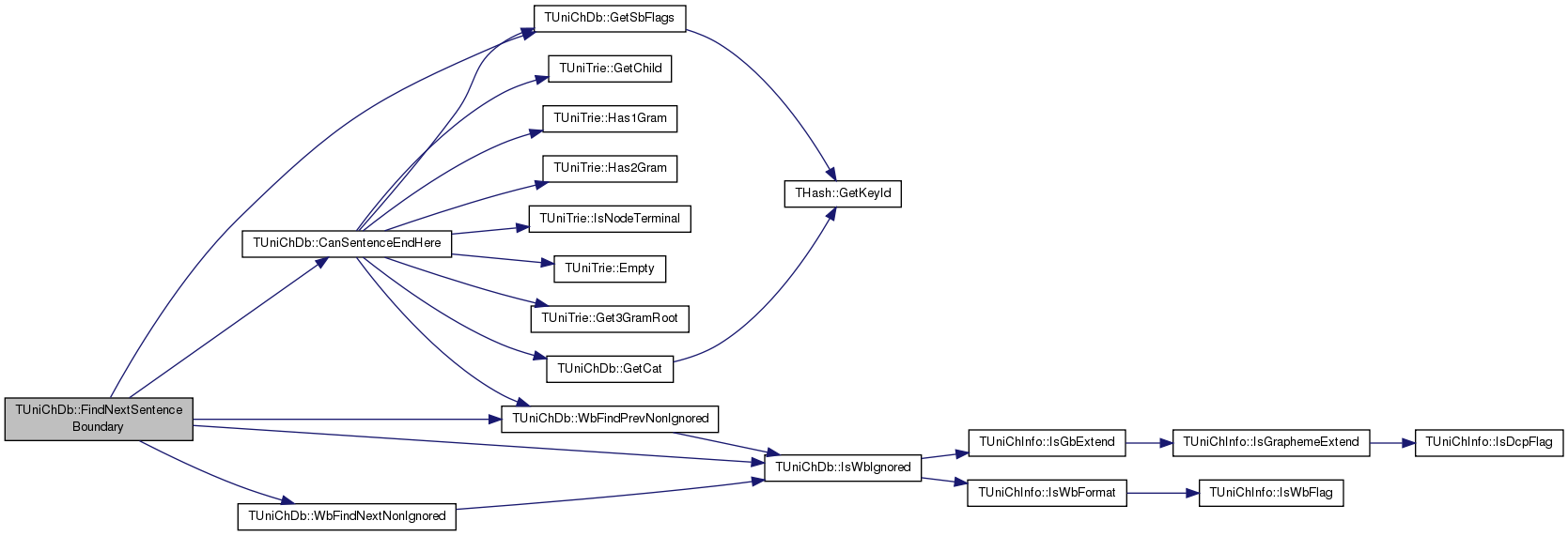

| bool TUniChDb::FindNextWordBoundary | ( | const TSrcVec & | src, |
| const size_t | srcIdx, | ||
| const size_t | srcCount, | ||
| size_t & | position | ||
| ) | const |
Definition at line 2483 of file unicode.h.
References GetWbFlags(), IAssert, IsWbIgnored(), TestCurNext, TestCurNext2, TestPrevCurNext, ucfWbALetter, ucfWbExtendNumLet, ucfWbKatakana, ucfWbMidLetter, ucfWbMidNum, ucfWbNumeric, WbFindNextNonIgnored(), and WbFindPrevNonIgnored().
Referenced by TUnicode::FindNextWordBoundary(), FindWordBoundaries(), GetCaseConverted(), GetSimpleCaseConverted(), TestFindNextWordOrSentenceBoundary(), and ToSimpleCaseConverted().

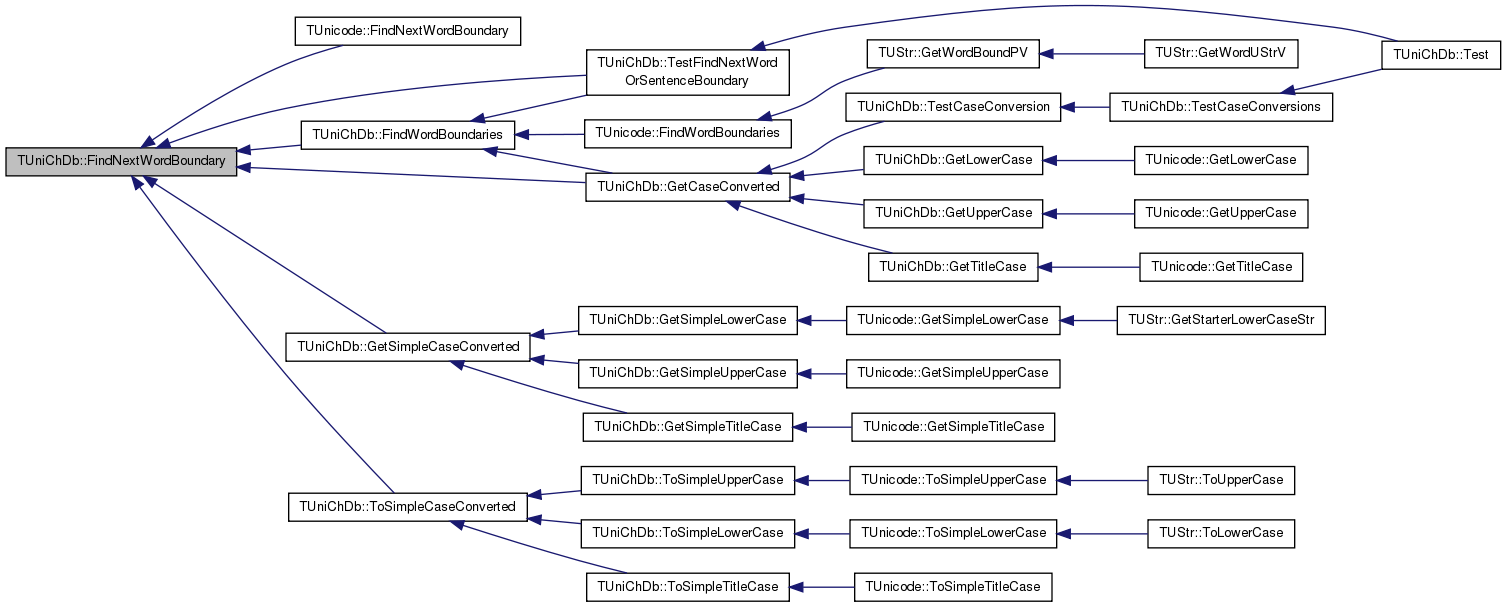
| void TUniChDb::FindSentenceBoundaries | ( | const TSrcVec & | src, |
| const size_t | srcIdx, | ||
| const size_t | srcCount, | ||
| TBoolV & | dest | ||
| ) | const |
Definition at line 2793 of file unicode.h.
References Assert, FindNextSentenceBoundary(), TVec< TVal, TSizeTy >::Gen(), TVec< TVal, TSizeTy >::Len(), and TVec< TVal, TSizeTy >::PutAll().
Referenced by TUnicode::FindSentenceBoundaries(), and TestFindNextWordOrSentenceBoundary().


| void TUniChDb::FindWordBoundaries | ( | const TSrcVec & | src, |
| const size_t | srcIdx, | ||
| const size_t | srcCount, | ||
| TBoolV & | dest | ||
| ) | const |
Definition at line 2561 of file unicode.h.
References Assert, FindNextWordBoundary(), TVec< TVal, TSizeTy >::Gen(), TVec< TVal, TSizeTy >::Len(), and TVec< TVal, TSizeTy >::PutAll().
Referenced by TUnicode::FindWordBoundaries(), GetCaseConverted(), and TestFindNextWordOrSentenceBoundary().


|
inlinestatic |
Definition at line 1304 of file unicode.h.
Referenced by InitWordAndSentenceBoundaryFlags(), and TestFindNextWordOrSentenceBoundary().

|
inlinestatic |
| void TUniChDb::GetCaseConverted | ( | const TSrcVec & | src, |
| size_t | srcIdx, | ||
| const size_t | srcCount, | ||
| TVec< TDestCh > & | dest, | ||
| const bool | clrDest, | ||
| const TCaseConversion | how, | ||
| const bool | turkic, | ||
| const bool | lithuanian | ||
| ) | const |
Definition at line 2817 of file unicode.h.
References TVec< TVal, TSizeTy >::Add(), TUniCaseFolding::AppendVector(), Assert, TUniChInfo::ccAbove, ccLower, TUniChInfo::ccStarter, ccTitle, ccUpper, TVec< TVal, TSizeTy >::Clr(), FindNextWordBoundary(), FindWordBoundaries(), GetCombiningClass(), THash< TKey, TDat, THashFunc >::GetKeyId(), h, IAssert, TUniChInfo::simpleLowerCaseMapping, TUniChInfo::simpleTitleCaseMapping, TUniChInfo::simpleUpperCaseMapping, specialCasingLower, specialCasingTitle, and specialCasingUpper.
Referenced by GetLowerCase(), GetTitleCase(), GetUpperCase(), and TestCaseConversion().


|
inline |
Definition at line 1629 of file unicode.h.
References TUniCaseFolding::Fold().
Referenced by GetCaseFolded(), and TUnicode::GetCaseFolded().


|
inline |
Definition at line 1632 of file unicode.h.
References GetCaseFolded().

|
inlinestatic |
|
inline |
Definition at line 1353 of file unicode.h.
References THash< TKey, TDat, THashFunc >::GetKeyId().
Referenced by TUnicode::___UniFwd2(), and CanSentenceEndHere().


|
inline |
Definition at line 1331 of file unicode.h.
References TStrPool::GetCStr(), and THash< TKey, TDat, THashFunc >::GetKeyId().
Referenced by TUnicode::GetCharName(), and GetCharNameS().


|
inline |
Definition at line 1332 of file unicode.h.
References GetCharName().
Referenced by TUnicode::GetCharNameS(), and PrintCharNames().


|
inline |
Definition at line 1399 of file unicode.h.
References TUniChInfo::ccStarter, and THash< TKey, TDat, THashFunc >::GetKeyId().
Referenced by Compose(), Decompose(), ExtractStarters(), and GetCaseConverted().

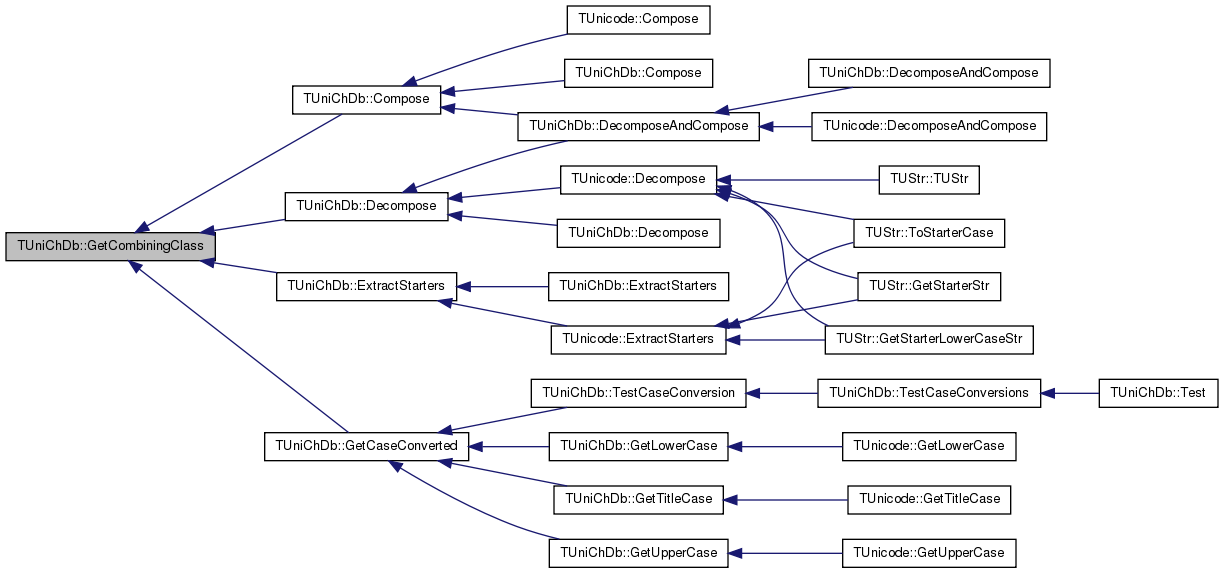
|
inlinestatic |
|
inlinestatic |
Definition at line 1301 of file unicode.h.
Referenced by InitDerivedCoreProperties().

|
inlinestatic |
Definition at line 1302 of file unicode.h.
Referenced by InitLineBreaks().

|
inline |
Definition at line 1590 of file unicode.h.
References ccLower, and GetCaseConverted().
Referenced by TUnicode::GetLowerCase().


|
inline |
Definition at line 1593 of file unicode.h.
References GetLowerCase().
Referenced by GetLowerCase().


|
inlinestatic |
Definition at line 1309 of file unicode.h.
Referenced by TestComposition().

|
inlinestatic |
Definition at line 1303 of file unicode.h.
Referenced by InitPropList().

|
inline |
Definition at line 1359 of file unicode.h.
References THash< TKey, TDat, THashFunc >::GetKeyId().
Referenced by CanSentenceEndHere(), FindNextSentenceBoundary(), and TestFindNextWordOrSentenceBoundary().


|
inline |
Definition at line 1323 of file unicode.h.
References TUniChInfo::script, and scriptUnknown.
Referenced by TUStr::GetChScriptId().

|
inline |
Definition at line 1324 of file unicode.h.
References THash< TKey, TDat, THashFunc >::GetKeyId(), GetScript(), and scriptUnknown.
Referenced by GetScript().


|
inline |
Definition at line 1322 of file unicode.h.
References THash< TKey, TDat, THashFunc >::GetKeyId().
Referenced by TUStr::GetScriptId(), InitAfterLoad(), InitWordAndSentenceBoundaryFlags(), and LoadTxt().


|
inline |
Definition at line 1321 of file unicode.h.
References THash< TKey, TDat, THashFunc >::GetKey().
Referenced by TUStr::GetScriptNm(), and TestWbFindNonIgnored().


|
inlinestatic |
Definition at line 1319 of file unicode.h.
Referenced by InitWordAndSentenceBoundaryFlags().

|
inlinestatic |
Definition at line 1318 of file unicode.h.
Referenced by InitWordAndSentenceBoundaryFlags().

|
inlinestatic |
Definition at line 1317 of file unicode.h.
Referenced by InitAfterLoad(), InitScripts(), and LoadTxt().

|
inlinestatic |
Definition at line 1300 of file unicode.h.
Referenced by InitScripts().

|
inlinestatic |
Definition at line 1308 of file unicode.h.
Referenced by InitWordAndSentenceBoundaryFlags().

|
inlinestatic |
Definition at line 1307 of file unicode.h.
Referenced by TestFindNextWordOrSentenceBoundary().

| void TUniChDb::GetSimpleCaseConverted | ( | const TSrcVec & | src, |
| size_t | srcIdx, | ||
| const size_t | srcCount, | ||
| TVec< TDestCh > & | dest, | ||
| const bool | clrDest, | ||
| const TCaseConversion | how | ||
| ) | const |
Definition at line 3042 of file unicode.h.
References TVec< TVal, TSizeTy >::Add(), ccLower, ccTitle, ccUpper, TVec< TVal, TSizeTy >::Clr(), FindNextWordBoundary(), THash< TKey, TDat, THashFunc >::GetKeyId(), h, IAssert, TUniChInfo::simpleLowerCaseMapping, TUniChInfo::simpleTitleCaseMapping, and TUniChInfo::simpleUpperCaseMapping.
Referenced by GetSimpleLowerCase(), GetSimpleTitleCase(), and GetSimpleUpperCase().


|
inline |
Definition at line 1601 of file unicode.h.
References ccLower, and GetSimpleCaseConverted().
Referenced by TUnicode::GetSimpleLowerCase().


|
inline |
Definition at line 1604 of file unicode.h.
References GetSimpleLowerCase().
Referenced by GetSimpleLowerCase().


|
inline |
Definition at line 1603 of file unicode.h.
References ccTitle, and GetSimpleCaseConverted().
Referenced by TUnicode::GetSimpleTitleCase().


|
inline |
Definition at line 1606 of file unicode.h.
References GetSimpleTitleCase().
Referenced by GetSimpleTitleCase().


|
inline |
Definition at line 1602 of file unicode.h.
References ccUpper, and GetSimpleCaseConverted().
Referenced by TUnicode::GetSimpleUpperCase().


|
inline |
Definition at line 1605 of file unicode.h.
References GetSimpleUpperCase().
Referenced by GetSimpleUpperCase().


|
inlinestatic |
Definition at line 1297 of file unicode.h.
Referenced by InitSpecialCasing().

|
inline |
Definition at line 1354 of file unicode.h.
References THash< TKey, TDat, THashFunc >::GetKeyId().
Referenced by TUnicode::GetSubCat().


|
inline |
Definition at line 1592 of file unicode.h.
References ccTitle, and GetCaseConverted().
Referenced by TUnicode::GetTitleCase().


|
inline |
Definition at line 1595 of file unicode.h.
References GetTitleCase().
Referenced by GetTitleCase().


|
inlinestatic |
|
inline |
Definition at line 1591 of file unicode.h.
References ccUpper, and GetCaseConverted().
Referenced by TUnicode::GetUpperCase().


|
inline |
Definition at line 1594 of file unicode.h.
References GetUpperCase().
Referenced by GetUpperCase().


|
inline |
Definition at line 1357 of file unicode.h.
References THash< TKey, TDat, THashFunc >::GetKeyId().
Referenced by FindNextWordBoundary(), and TestFindNextWordOrSentenceBoundary().

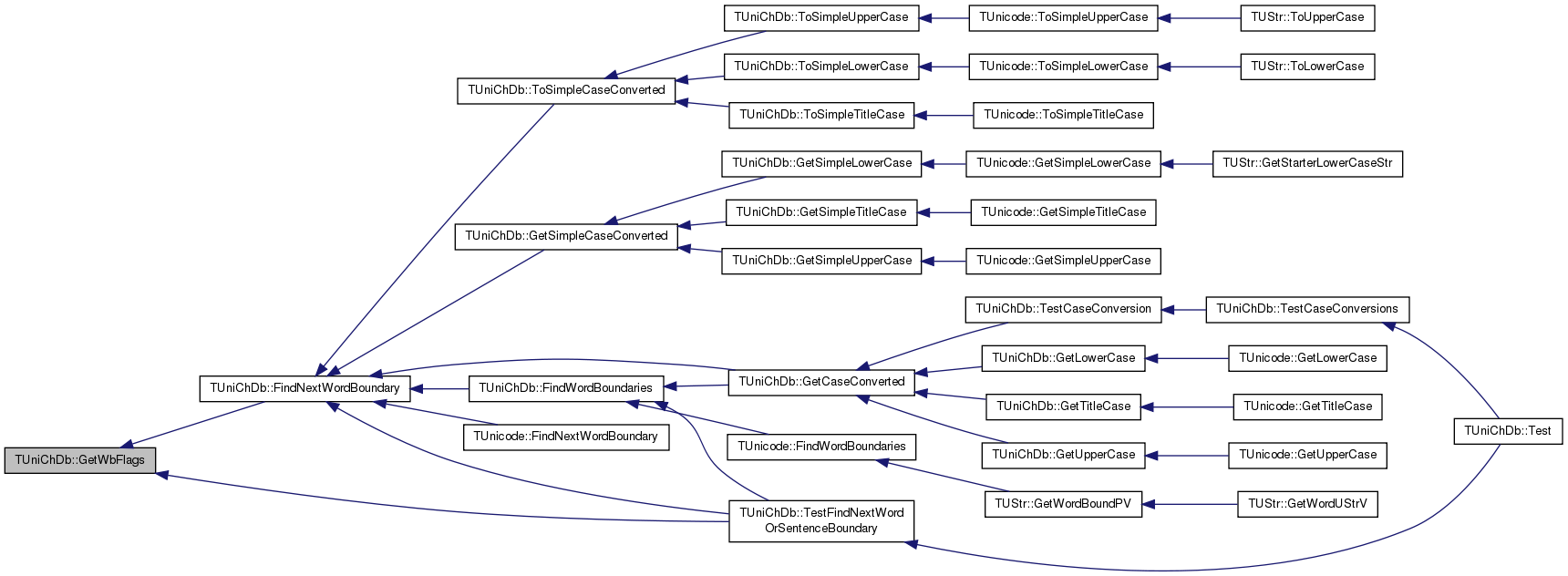
|
inlinestatic |
Definition at line 1306 of file unicode.h.
Referenced by InitWordAndSentenceBoundaryFlags().

|
inlinestatic |
Definition at line 1305 of file unicode.h.
Referenced by TestFindNextWordOrSentenceBoundary().

|
protected |
Definition at line 1368 of file unicode.cpp.
References GetScriptByName(), GetScriptNameUnknown(), IAssert, and scriptUnknown.
Referenced by Load().


|
protected |
Definition at line 1007 of file unicode.cpp.
References THash< TKey, TDat, THashFunc >::AddKey(), TUniChDb::TUcdFileReader::Close(), anonymous_namespace{unicode.cpp}::CombinePath(), TStr::CStr(), FailR, GetDerivedCorePropsFn(), THash< TKey, TDat, THashFunc >::GetKeyId(), TUniChDb::TUcdFileReader::GetNextLine(), h, IAssert, TUniChInfo::IsDcpFlag(), TVec< TVal, TSizeTy >::Len(), TUniChDb::TUcdFileReader::Open(), TUniChDb::TUcdFileReader::ParseCodePointRange(), TUniChDb::TSubcatHelper::ProcessComment(), TUniChDb::TSubcatHelper::SetCat(), TUniChInfo::SetDcpFlag(), TUniChDb::TSubcatHelper::TestCat(), ucfCompatibilityDecomposition, ucfDcpAlphabetic, ucfDcpDefaultIgnorableCodePoint, ucfDcpGraphemeBase, ucfDcpGraphemeExtend, ucfDcpIdContinue, ucfDcpIdStart, ucfDcpLowercase, ucfDcpMath, ucfDcpUppercase, ucfDcpXidContinue, and ucfDcpXidStart.
Referenced by LoadTxt().
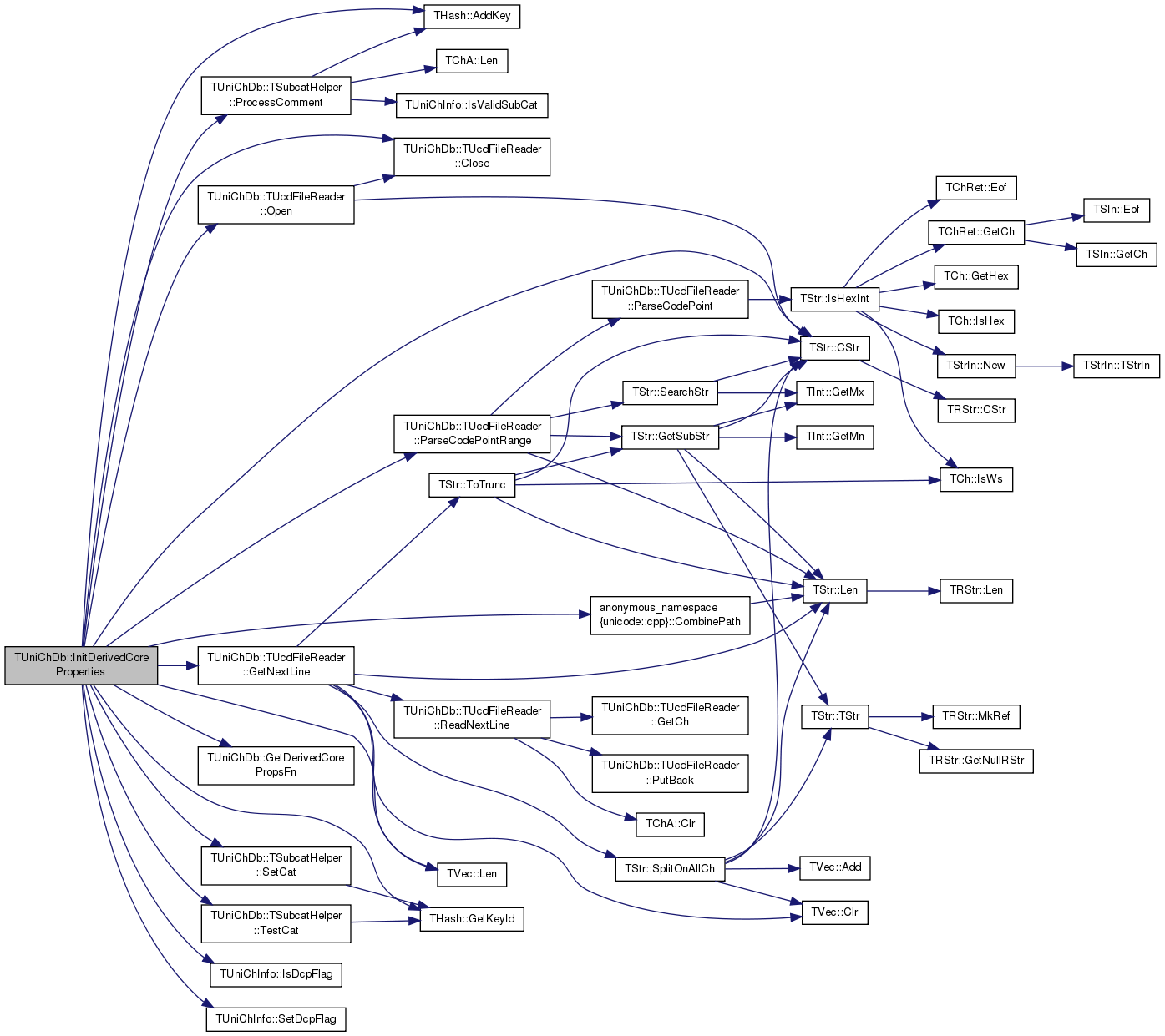

|
protected |
Definition at line 1046 of file unicode.cpp.
References THash< TKey, TDat, THashFunc >::AddKey(), TUniChDb::TUcdFileReader::Close(), anonymous_namespace{unicode.cpp}::CombinePath(), THash< TKey, TDat, THashFunc >::FFirstKeyId(), THash< TKey, TDat, THashFunc >::FNextKeyId(), THash< TKey, TDat, THashFunc >::GetKeyId(), TUniChInfo::GetLineBreakCode(), GetLineBreakFn(), TUniChDb::TUcdFileReader::GetNextLine(), h, IAssert, TStr::Len(), TVec< TVal, TSizeTy >::Len(), TUniChInfo::LineBreak_Unknown, TUniChDb::TUcdFileReader::Open(), and TUniChDb::TUcdFileReader::ParseCodePointRange().
Referenced by LoadTxt().
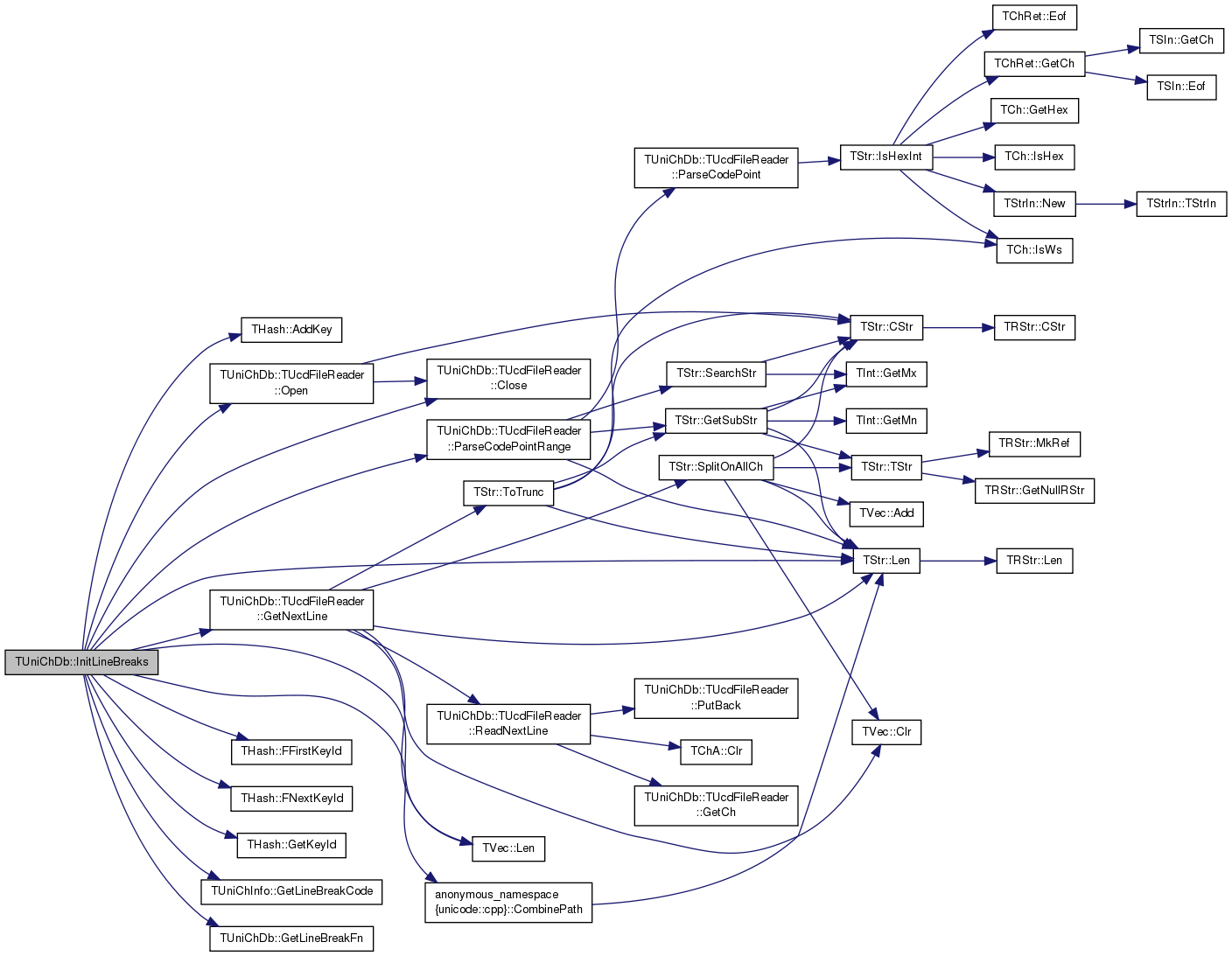

|
protected |
Definition at line 950 of file unicode.cpp.
References THash< TKey, TDat, THashFunc >::AddKey(), TUniChDb::TUcdFileReader::Close(), anonymous_namespace{unicode.cpp}::CombinePath(), TStr::CStr(), FailR, THash< TKey, TDat, THashFunc >::GetKeyId(), TUniChDb::TUcdFileReader::GetNextLine(), GetPropListFn(), h, IAssert, TUniChInfo::IsProperty(), TUniChInfo::IsPropertyX(), TVec< TVal, TSizeTy >::Len(), TUniChDb::TUcdFileReader::Open(), TUniChDb::TUcdFileReader::ParseCodePointRange(), TUniChDb::TSubcatHelper::ProcessComment(), TUniChDb::TSubcatHelper::SetCat(), TUniChInfo::SetProperty(), TUniChInfo::SetPropertyX(), TUniChDb::TSubcatHelper::TestCat(), ucfPrAsciiHexDigit, ucfPrBidiControl, ucfPrDash, ucfPrDeprecated, ucfPrDiacritic, ucfPrExtender, ucfPrHexDigit, ucfPrHyphen, ucfPrIdeographic, ucfPrJoinControl, ucfPrLogicalOrderException, ucfPrNoncharacterCodePoint, ucfPrPatternSyntax, ucfPrPatternWhiteSpace, ucfPrQuotationMark, ucfPrSoftDotted, ucfPrSTerm, ucfPrTerminalPunctuation, ucfPrVariationSelector, ucfPrWhiteSpace, ucfPxIdsBinaryOperator, ucfPxIdsTrinaryOperator, ucfPxOtherAlphabetic, ucfPxOtherDefaultIgnorableCodePoint, ucfPxOtherGraphemeExtend, ucfPxOtherIdContinue, ucfPxOtherIdStart, ucfPxOtherLowercase, ucfPxOtherMath, ucfPxOtherUppercase, ucfPxRadical, and ucfPxUnifiedIdeograph.
Referenced by LoadTxt().
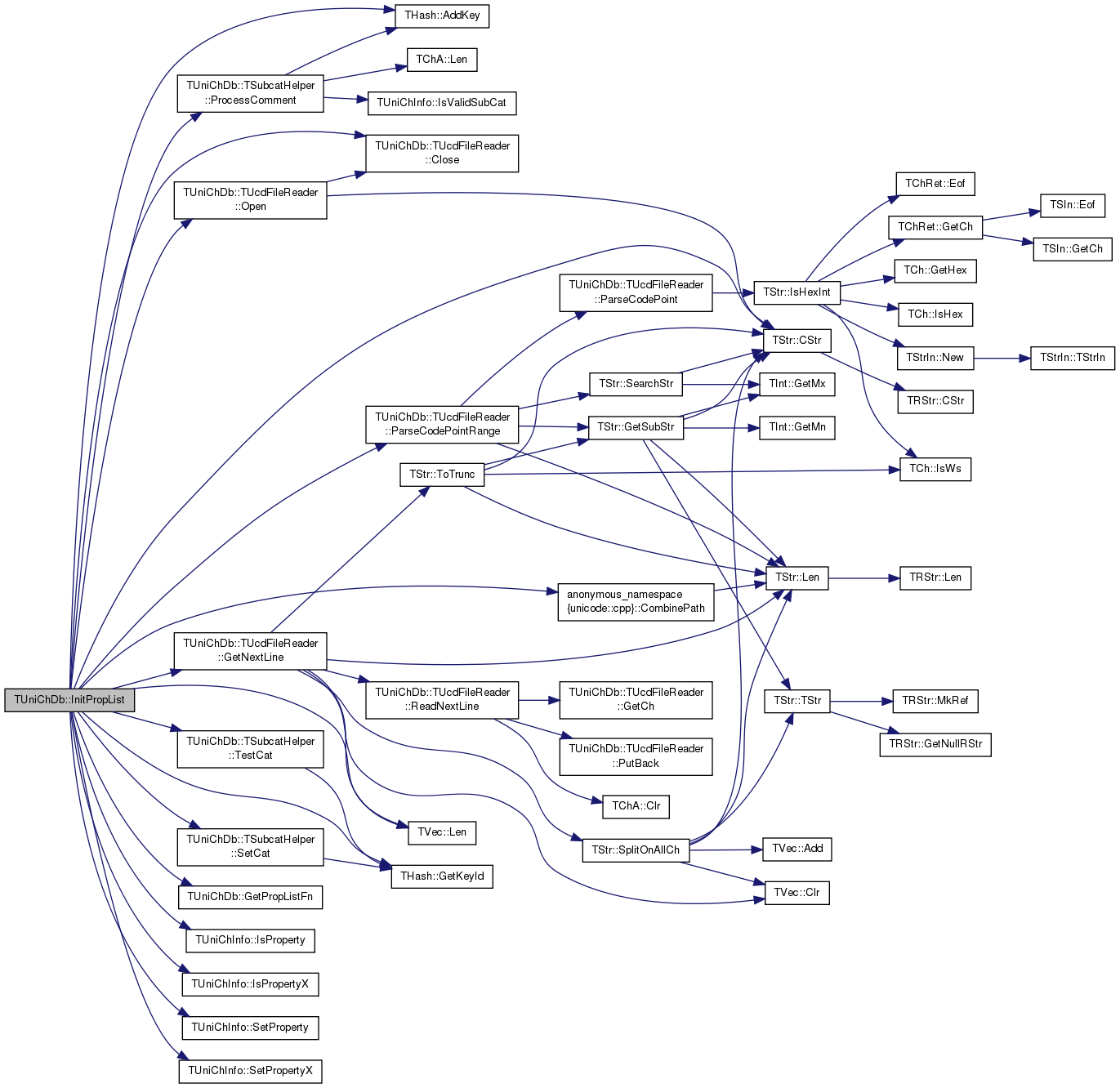

|
protected |
Definition at line 1073 of file unicode.cpp.
References THash< TKey, TDat, THashFunc >::AddDat(), THash< TKey, TDat, THashFunc >::AddKey(), AlwaysFalse(), TUniChDb::TUcdFileReader::Close(), anonymous_namespace{unicode.cpp}::CombinePath(), TStr::CStr(), THash< TKey, TDat, THashFunc >::FFirstKeyId(), THash< TKey, TDat, THashFunc >::FNextKeyId(), THash< TKey, TDat, THashFunc >::GetKey(), THash< TKey, TDat, THashFunc >::GetKeyId(), TUniChDb::TUcdFileReader::GetNextLine(), GetScriptNameUnknown(), GetScriptsFn(), h, IAssert, THash< TKey, TDat, THashFunc >::Len(), TUniChDb::TUcdFileReader::Open(), TUniChDb::TUcdFileReader::ParseCodePointRange(), TUniChDb::TSubcatHelper::ProcessComment(), TUniChInfo::script, scripts, TUniChDb::TSubcatHelper::SetCat(), and TUniChDb::TSubcatHelper::TestCat().
Referenced by LoadTxt().
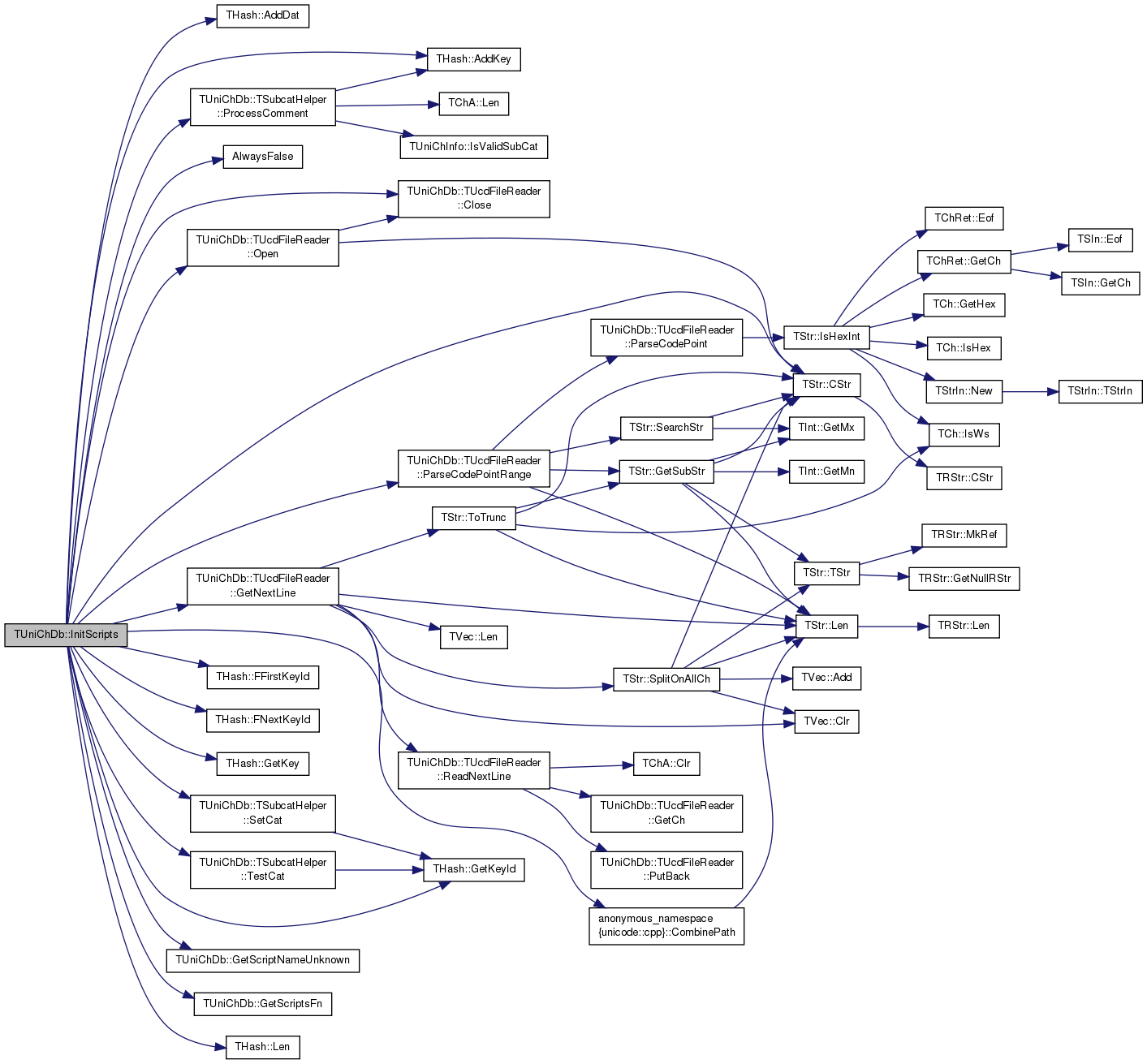

|
protected |
Definition at line 1225 of file unicode.cpp.
References THash< TKey, TDat, THashFunc >::AddDat(), TUniChDb::TUcdFileReader::Close(), anonymous_namespace{unicode.cpp}::CombinePath(), TStr::Empty(), TUniChDb::TUcdFileReader::GetNextLine(), GetSpecialCasingFn(), IAssert, TVec< TVal, TSizeTy >::Last(), TVec< TVal, TSizeTy >::Len(), TUniChDb::TUcdFileReader::Open(), TUniChDb::TUcdFileReader::ParseCodePoint(), TUniChDb::TUcdFileReader::ParseCodePointList(), specialCasingLower, specialCasingTitle, and specialCasingUpper.
Referenced by LoadTxt().
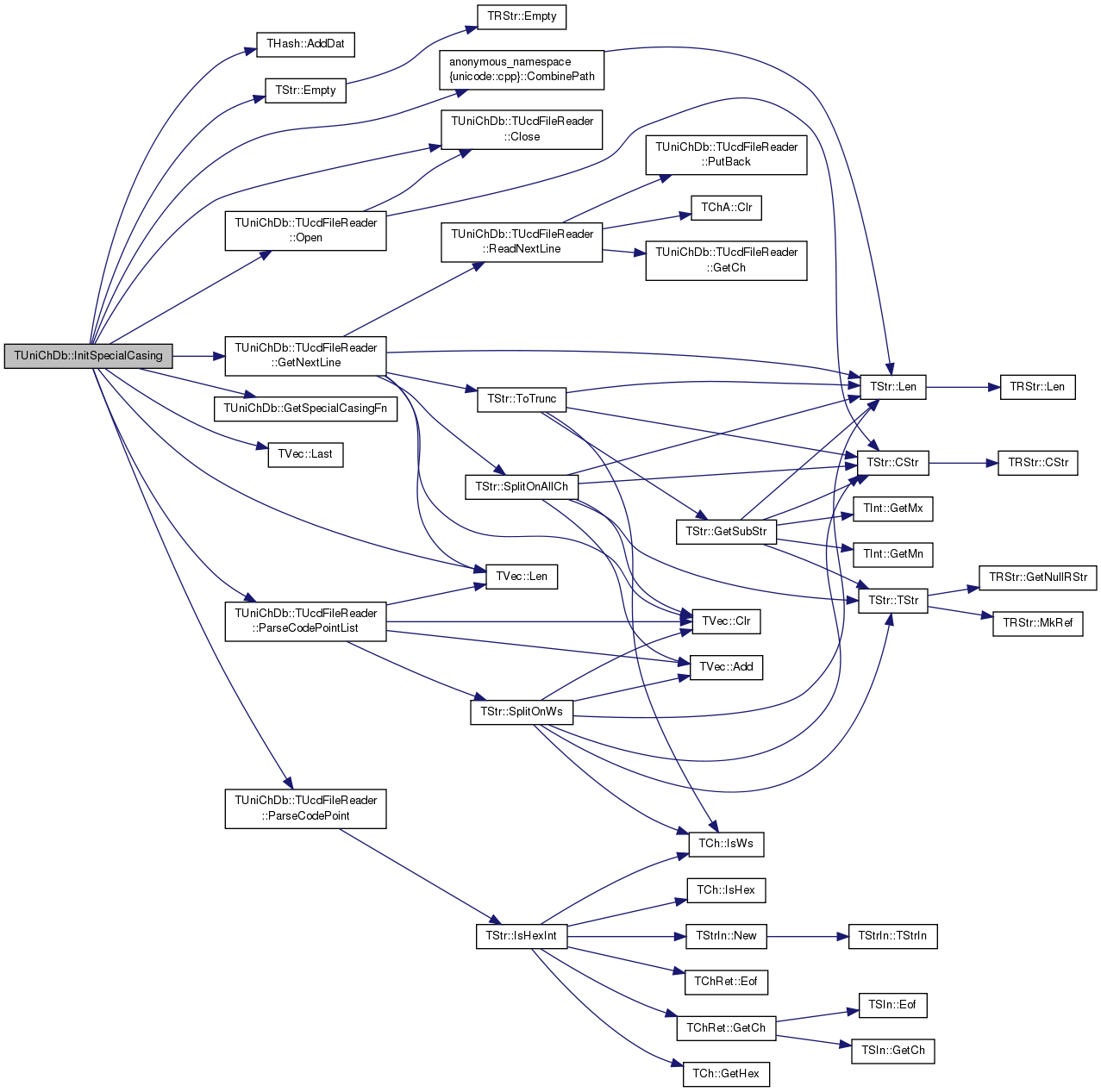

|
protected |
Definition at line 1100 of file unicode.cpp.
References TVec< TVal, TSizeTy >::Add(), THash< TKey, TDat, THashFunc >::AddDat(), TUniChDb::TUcdFileReader::Close(), TUniChInfo::ClrWbAndSbFlags(), anonymous_namespace{unicode.cpp}::CombinePath(), TStr::CStr(), Fail, FailR, THash< TKey, TDat, THashFunc >::FFirstKeyId(), THash< TKey, TDat, THashFunc >::FNextKeyId(), GetAuxiliaryDir(), THash< TKey, TDat, THashFunc >::GetDat(), THash< TKey, TDat, THashFunc >::GetKey(), THash< TKey, TDat, THashFunc >::GetKeyId(), TUniChDb::TUcdFileReader::GetNextLine(), TUniChInfo::GetSbFlags(), TUniChInfo::GetSbFlagsStr(), GetScriptByName(), GetScriptNameHiragana(), GetScriptNameKatakana(), GetSentenceBreakPropertyFn(), TUniChInfo::GetWbFlags(), GetWordBreakPropertyFn(), h, IAssert, TUniChInfo::IsAlphabetic(), TUniChInfo::IsGraphemeExtend(), TUniChInfo::IsIdeographic(), THash< TKey, TDat, THashFunc >::IsKey(), TUniChInfo::IsLowercase(), TUniChInfo::IsSbFlag(), TUniChInfo::IsSTerminal(), TUniChInfo::IsUppercase(), TUniChInfo::IsWbFlag(), TUniChInfo::IsWhiteSpace(), TVec< TVal, TSizeTy >::Len(), TUniChInfo::lineBreak, TUniChInfo::LineBreak_ComplexContext, TUniChInfo::LineBreak_InfixNumeric, TUniChInfo::LineBreak_Numeric, TUniChInfo::LineBreak_Quotation, TVec< TVal, TSizeTy >::Merge(), TUniChDb::TUcdFileReader::Open(), TUniChDb::TUcdFileReader::ParseCodePointRange(), TUniChInfo::script, TUniChInfo::SetSbFlag(), TUniChInfo::SetWbFlag(), TVec< TVal, TSizeTy >::Sort(), TUniChInfo::subCat, ucfCompatibilityDecomposition, ucfSbATerm, ucfSbClose, ucfSbFormat, ucfSbLower, ucfSbNumeric, ucfSbOLetter, ucfSbSep, ucfSbSp, ucfSbSTerm, ucfSbUpper, ucfWbALetter, ucfWbExtendNumLet, ucfWbFormat, ucfWbKatakana, ucfWbMidLetter, ucfWbMidNum, ucfWbNumeric, and anonymous_namespace{unicode.cpp}::VB.
Referenced by LoadTxt().
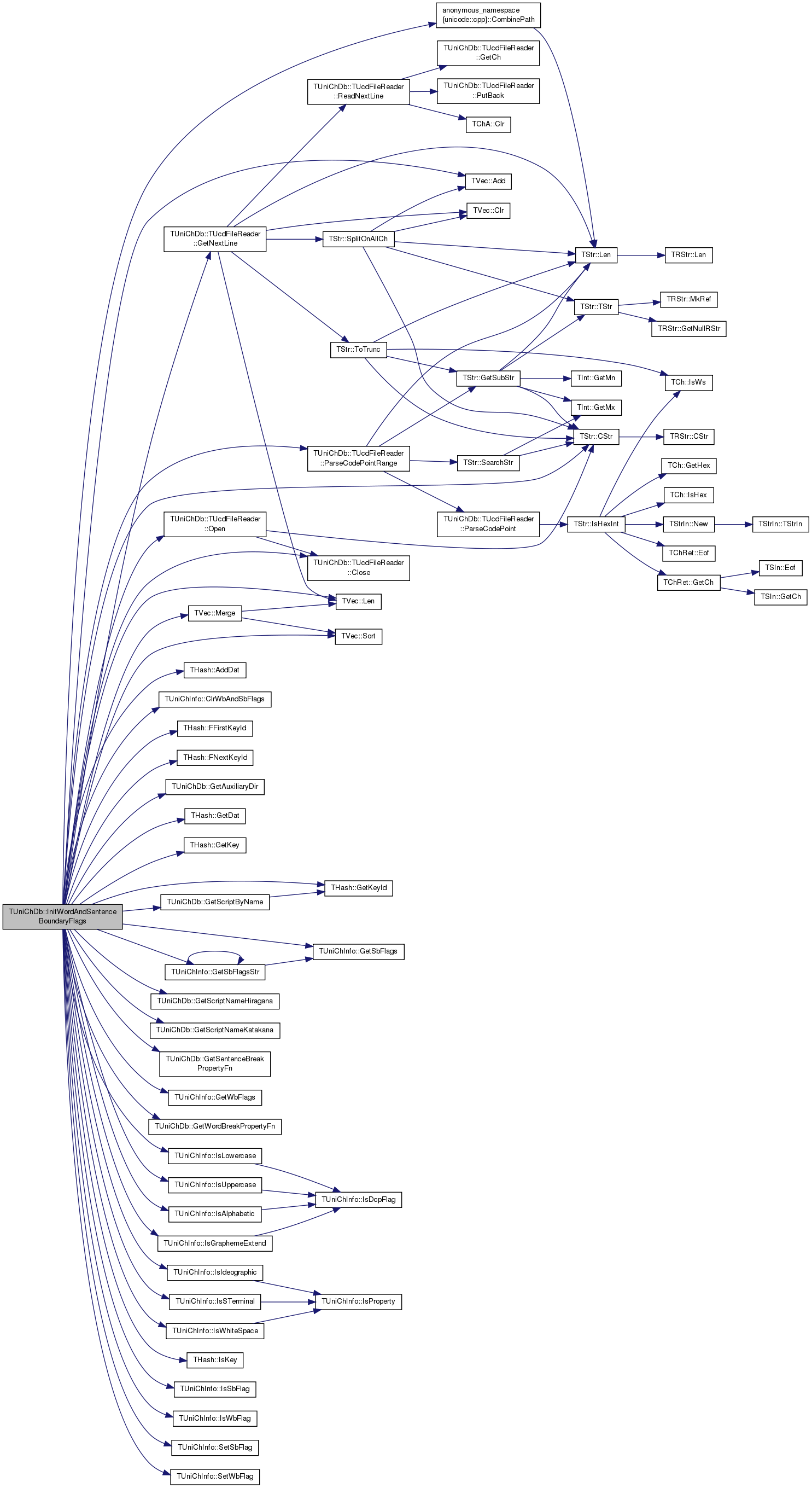

|
inline |
Definition at line 1350 of file unicode.h.
References THash< TKey, TDat, THashFunc >::GetKeyId().

|
inline |
Definition at line 1383 of file unicode.h.
References THash< TKey, TDat, THashFunc >::GetKeyId().

|
inline |
Definition at line 1358 of file unicode.h.
References THash< TKey, TDat, THashFunc >::GetKeyId().

|
inline |
Definition at line 1392 of file unicode.h.
References THash< TKey, TDat, THashFunc >::GetKeyId().

|
inline |
Definition at line 1356 of file unicode.h.
References THash< TKey, TDat, THashFunc >::GetKeyId().

|
inlinestaticprotected |
Definition at line 1419 of file unicode.h.
References TUniChInfo::IsGbExtend(), and TUniChInfo::IsWbFormat().
Referenced by FindNextSentenceBoundary(), FindNextWordBoundary(), TestFindNextWordOrSentenceBoundary(), TestWbFindNonIgnored(), WbFindCurOrNextNonIgnored(), WbFindNextNonIgnored(), WbFindNextNonIgnoredS(), and WbFindPrevNonIgnored().

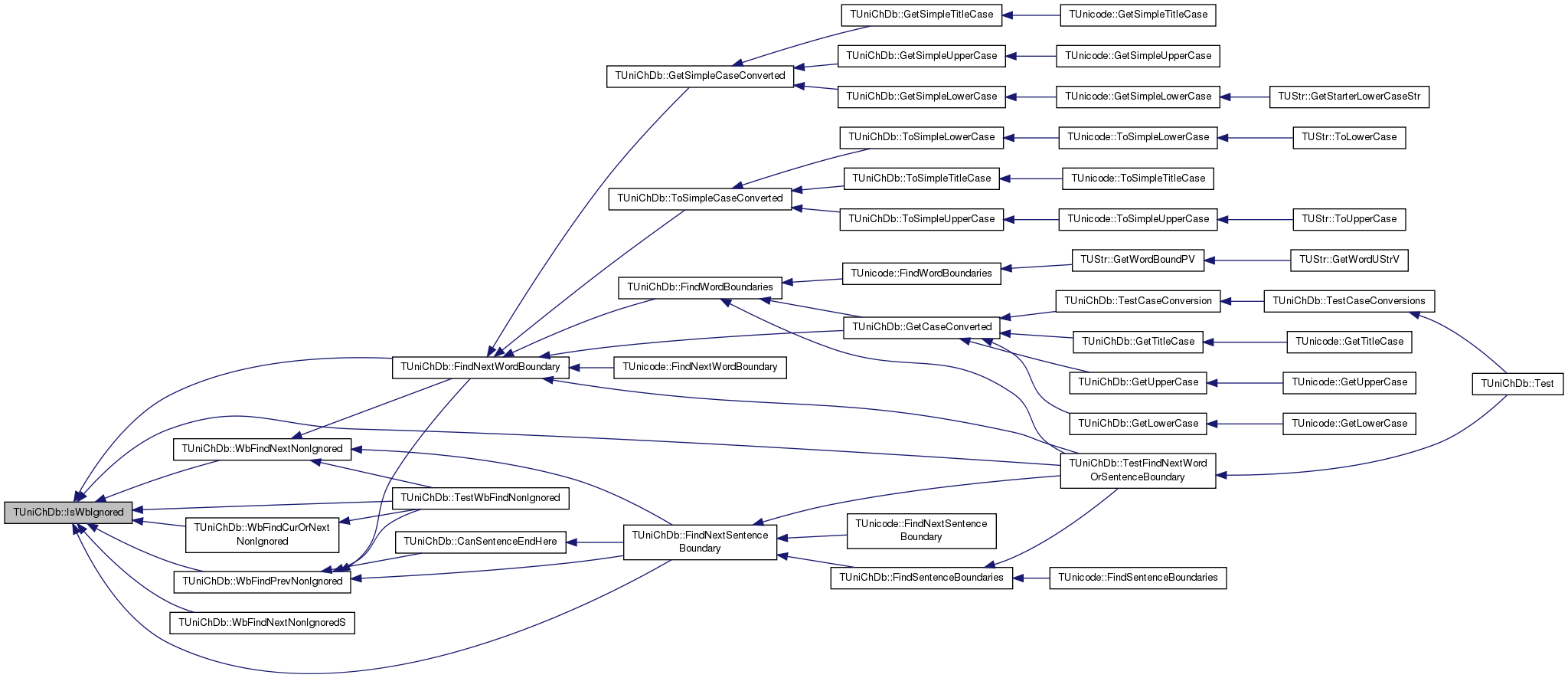
|
inlineprotected |
Definition at line 1420 of file unicode.h.
References THash< TKey, TDat, THashFunc >::GetKeyId(), and IsWbIgnored().
Referenced by IsWbIgnored().


|
inline |
Definition at line 1285 of file unicode.h.
References charNames, InitAfterLoad(), THash< TKey, TDat, THashFunc >::Load(), TUniCaseFolding::Load(), TVec< TVal, TSizeTy >::Load(), TSIn::LoadCs(), and TStrPool::~TStrPool().
Referenced by LoadBin(), Test(), and TUniChDb().
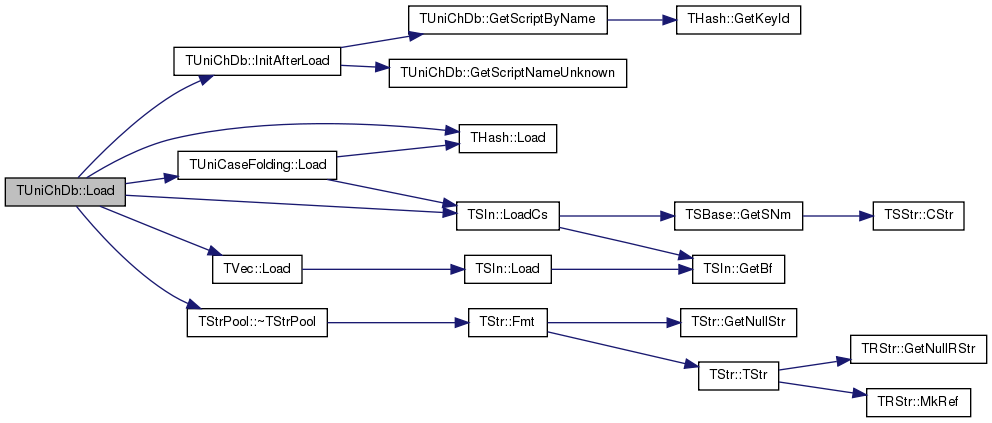

|
inline |
Definition at line 1291 of file unicode.h.
References Load(), and TFIn::New().
Referenced by TUnicode::TUnicode().
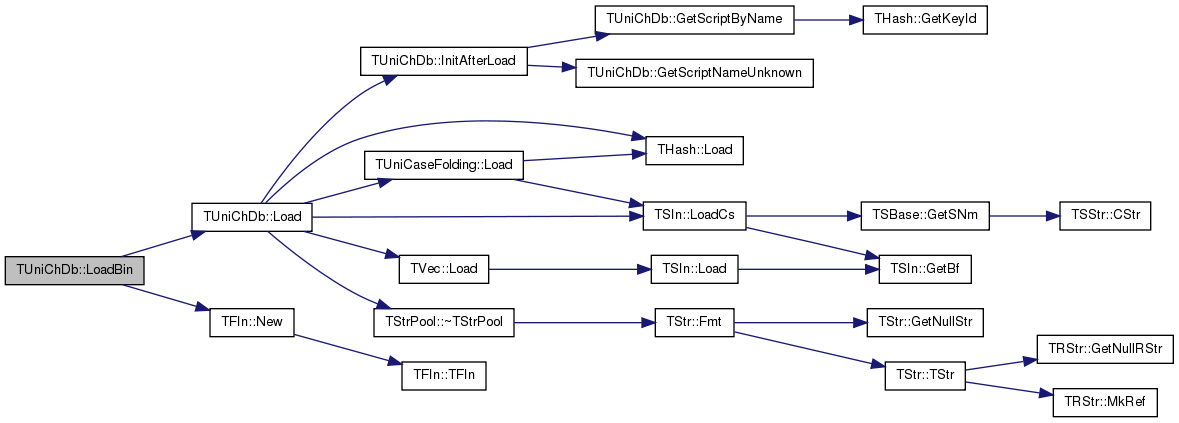

| void TUniChDb::LoadTxt | ( | const TStr & | basePath | ) |
Definition at line 1249 of file unicode.cpp.
References THash< TKey, TDat, THashFunc >::AddDat(), THash< TKey, TDat, THashFunc >::AddKey(), TStrPool::AddStr(), caseFolding, TUniChInfo::ccInvalid, TUniChInfo::ccStarter, charNames, TUniChInfo::chCat, TUniChInfo::chSubCat, TUniChDb::TUcdFileReader::Close(), Clr(), TUniChInfo::combClass, anonymous_namespace{unicode.cpp}::CombinePath(), TStr::CStr(), TUniChInfo::decompOffset, decompositions, TStr::Empty(), THash< TKey, TDat, THashFunc >::FFirstKeyId(), TUniChInfo::flags, THash< TKey, TDat, THashFunc >::FNextKeyId(), GetCaseFoldingFn(), GetCompositionExclusionsFn(), THash< TKey, TDat, THashFunc >::GetDat(), THash< TKey, TDat, THashFunc >::GetKey(), THash< TKey, TDat, THashFunc >::GetKeyId(), TUniChDb::TUcdFileReader::GetNextLine(), GetScriptByName(), GetScriptNameUnknown(), GetUnicodeDataFn(), h, HangulSBase, HangulSCount, IAssert, IAssertR, TUniChInfo::InitAfterLoad(), InitDerivedCoreProperties(), InitLineBreaks(), InitPropList(), InitScripts(), InitSpecialCasing(), InitWordAndSentenceBoundaryFlags(), inverseDec, TUniChInfo::IsCompatibilityDecomposition(), TUniChInfo::IsCompositionExclusion(), TStr::IsInt(), THash< TKey, TDat, THashFunc >::IsKey(), THash< TKey, TDat, THashFunc >::Len(), TStr::Len(), TVec< TVal, TSizeTy >::Len(), TUniCaseFolding::LoadTxt(), LoadTxt_ProcessDecomposition(), TUCh::Mn, TUCh::Mx, TUniChInfo::nameOffset, TUniChDb::TUcdFileReader::Open(), TUniChDb::TUcdFileReader::ParseCodePoint(), TUniChInfo::script, scriptUnknown, TUniChInfo::simpleLowerCaseMapping, TUniChInfo::simpleTitleCaseMapping, TUniChInfo::simpleUpperCaseMapping, and ucfCompositionExclusion.
Referenced by Test().


|
protected |
Definition at line 937 of file unicode.cpp.
References TVec< TVal, TSizeTy >::Add(), TVec< TVal, TSizeTy >::AddV(), TUniChInfo::decompOffset, decompositions, TStr::Empty(), TUniChInfo::flags, TStr::GetSubStr(), IAssert, TStr::Len(), TVec< TVal, TSizeTy >::Len(), TUniChDb::TUcdFileReader::ParseCodePointList(), TStr::SearchCh(), TStr::ToTrunc(), and ucfCompatibilityDecomposition.
Referenced by LoadTxt().
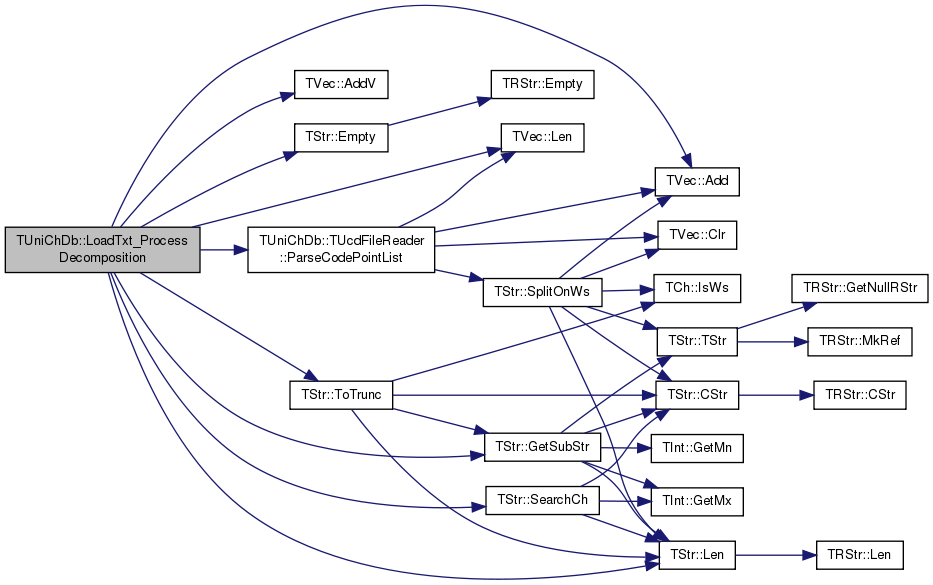

|
inline |
Definition at line 1336 of file unicode.h.
References TStr::CStr(), and GetCharNameS().

|
inline |
Definition at line 1342 of file unicode.h.
References PrintCharNames().
Referenced by PrintCharNames().


|
inline |
Definition at line 1280 of file unicode.h.
References THash< TKey, TDat, THashFunc >::Save(), TUniCaseFolding::Save(), TVec< TVal, TSizeTy >::Save(), TStrPool::Save(), and TSOut::SaveCs().
Referenced by SaveBin(), and Test().
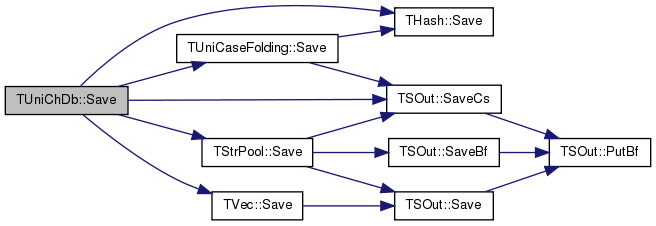

| void TUniChDb::SaveBin | ( | const TStr & | fnBinUcd | ) |
Definition at line 1362 of file unicode.cpp.
References TFOut::New(), and Save().
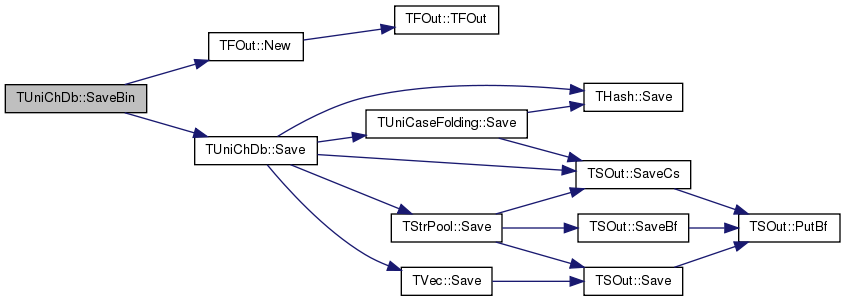
|
inline |
Definition at line 1490 of file unicode.h.
References TUniTrie< TItem_ >::Add().
Referenced by SbEx_Add(), SbEx_AddMulti(), and SbEx_AddUtf8().


|
inline |
Definition at line 1492 of file unicode.h.
References TVec< TVal, TSizeTy >::Gen(), TStr::Len(), and SbEx_Add().

|
inline |
Definition at line 1495 of file unicode.h.
References TVec< TVal, TSizeTy >::Len(), SbEx_Add(), SbEx_AddUtf8(), and TStr::SplitOnAllCh().
Referenced by SbEx_SetStdEnglish().
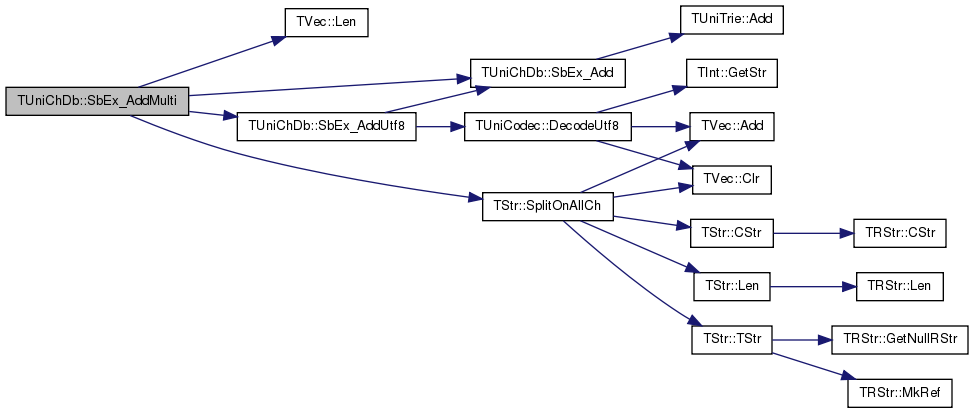

|
inline |
Definition at line 1494 of file unicode.h.
References TUniCodec::DecodeUtf8(), and SbEx_Add().
Referenced by SbEx_AddMulti().
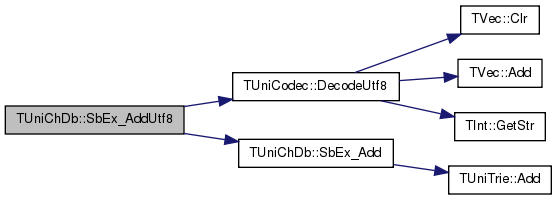

|
inline |
Definition at line 1489 of file unicode.h.
References TUniTrie< TItem_ >::Clr().
Referenced by TUnicode::ClrSentenceBoundaryExceptions(), and SbEx_SetStdEnglish().


|
inline |
Definition at line 1499 of file unicode.h.
References SbEx_AddMulti(), and SbEx_Clr().
Referenced by TUnicode::UseEnglishSentenceBoundaryExceptions().


| void TUniChDb::Test | ( | const TStr & | basePath | ) |
Definition at line 1377 of file unicode.cpp.
References caseFolding, anonymous_namespace{unicode.cpp}::CombinePath(), TFile::Exists(), GetBinFn(), Load(), LoadTxt(), TFIn::New(), TFOut::New(), Save(), TUniCaseFolding::Test(), TestCaseConversions(), TestComposition(), TestFindNextWordOrSentenceBoundary(), TestWbFindNonIgnored(), and TUniChDb().

|
protected |
Definition at line 825 of file unicode.cpp.
References ccLower, ccTitle, ccUpper, GetCaseConverted(), IAssert, TVec< TVal, TSizeTy >::Len(), and TUniChDb::TUcdFileReader::ParseCodePointList().
Referenced by TestCaseConversions().
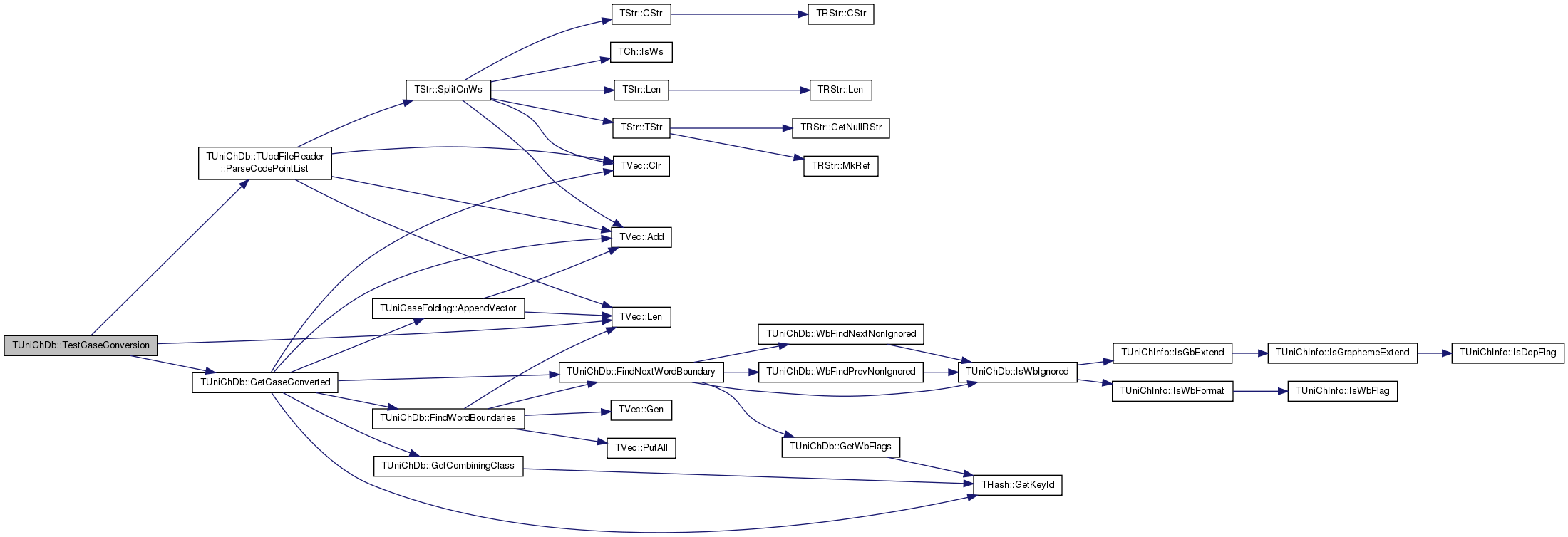

|
protected |
Definition at line 853 of file unicode.cpp.
References TestCaseConversion().
Referenced by Test().


|
protected |
Definition at line 745 of file unicode.cpp.
References TVec< TVal, TSizeTy >::Add(), THash< TKey, TDat, THashFunc >::AddKey(), TUniChDb::TUcdFileReader::Close(), anonymous_namespace{unicode.cpp}::CombinePath(), THash< TKey, TDat, THashFunc >::FFirstKeyId(), THash< TKey, TDat, THashFunc >::FNextKeyId(), THash< TKey, TDat, THashFunc >::GetKey(), TUniChDb::TUcdFileReader::GetNextLine(), GetNormalizationTestFn(), h, IAssert, THash< TKey, TDat, THashFunc >::IsKey(), TVec< TVal, TSizeTy >::Len(), NFC_, NFD_, NFKC_, NFKD_, TUniChDb::TUcdFileReader::Open(), and TUniChDb::TUcdFileReader::ParseCodePointList().
Referenced by Test().
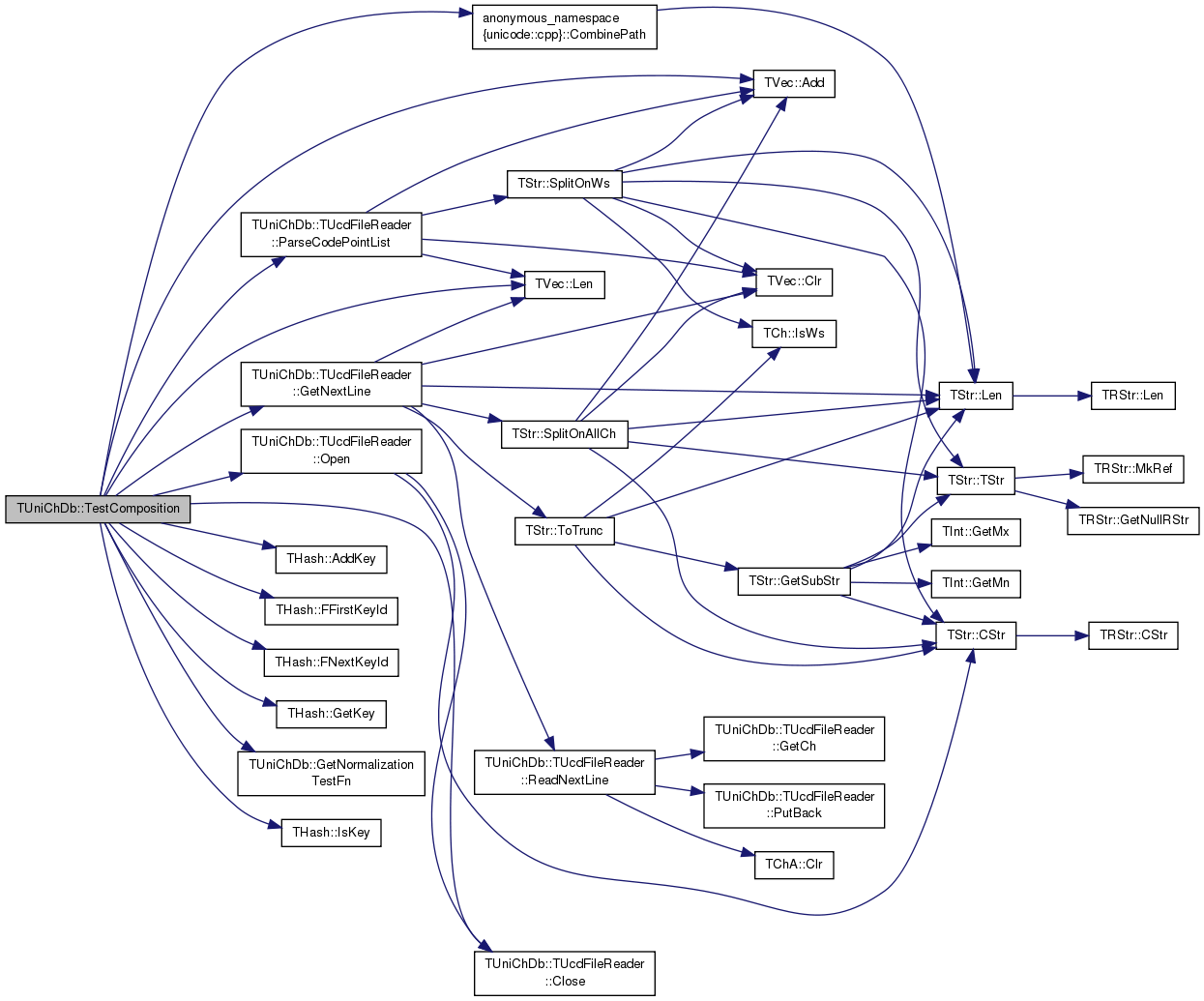

|
protected |
Definition at line 649 of file unicode.cpp.
References TVec< TVal, TSizeTy >::Add(), TVec< TVal, TSizeTy >::AddV(), AlwaysFalse(), TUniChDb::TUcdFileReader::Close(), anonymous_namespace{unicode.cpp}::CombinePath(), TStr::CStr(), Fail, FailR, FindNextSentenceBoundary(), FindNextWordBoundary(), FindSentenceBoundaries(), FindWordBoundaries(), TVec< TVal, TSizeTy >::Gen(), GetAuxiliaryDir(), TUniChDb::TUcdFileReader::GetNextLine(), GetSbFlags(), TUniChInfo::GetSbFlagsStr(), GetSentenceBreakTestFn(), TRnd::GetUniDevInt(), GetWbFlags(), TUniChInfo::GetWbFlagsStr(), GetWordBreakTestFn(), IAssert, IsWbIgnored(), TVec< TVal, TSizeTy >::Len(), TUniChDb::TUcdFileReader::Open(), TUniChDb::TUcdFileReader::ParseCodePoint(), and TVec< TVal, TSizeTy >::PutAll().
Referenced by Test().
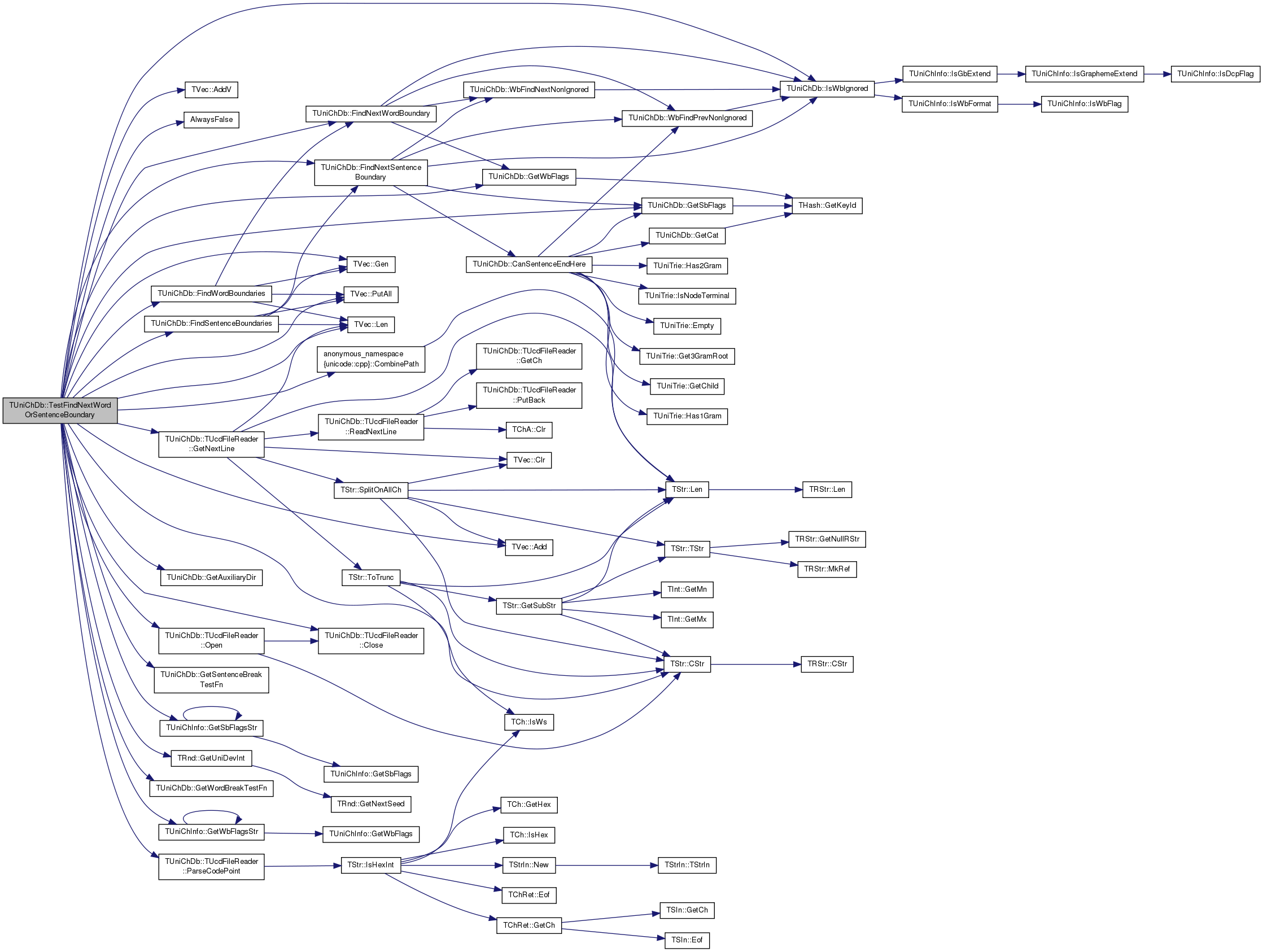

|
protected |
Definition at line 579 of file unicode.cpp.
References TVec< TVal, TSizeTy >::Gen(), IAssert, IsWbIgnored(), TVec< TVal, TSizeTy >::Len(), WbFindCurOrNextNonIgnored(), WbFindNextNonIgnored(), and WbFindPrevNonIgnored().

|
protected |
Definition at line 619 of file unicode.cpp.
References TVec< TVal, TSizeTy >::Add(), TStr::CStr(), THash< TKey, TDat, THashFunc >::FFirstKeyId(), TUniChInfo::flags, THash< TKey, TDat, THashFunc >::FNextKeyId(), TVec< TVal, TSizeTy >::Gen(), THash< TKey, TDat, THashFunc >::GetKey(), GetScriptName(), h, IsWbIgnored(), TVec< TVal, TSizeTy >::Len(), TUniChInfo::properties, TUniChInfo::propertiesX, TUniChInfo::script, and TVec< TVal, TSizeTy >::Sort().
Referenced by Test().
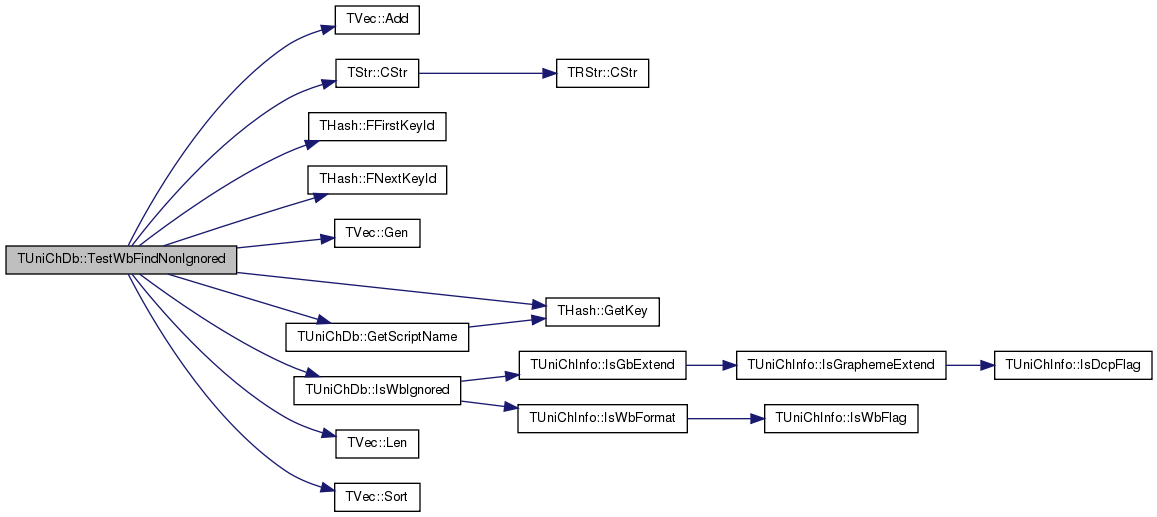

|
inline |
Definition at line 1636 of file unicode.h.
References TUniCaseFolding::FoldInPlace().
Referenced by TUnicode::ToCaseFolded().


|
inline |
Definition at line 1637 of file unicode.h.
References ToCaseFolded().
Referenced by ToCaseFolded().


| void TUniChDb::ToSimpleCaseConverted | ( | TSrcVec & | src, |
| size_t | srcIdx, | ||
| const size_t | srcCount, | ||
| const TCaseConversion | how | ||
| ) | const |
Definition at line 3072 of file unicode.h.
References ccLower, ccTitle, ccUpper, FindNextWordBoundary(), THash< TKey, TDat, THashFunc >::GetKeyId(), h, IAssert, TUniChInfo::simpleLowerCaseMapping, TUniChInfo::simpleTitleCaseMapping, and TUniChInfo::simpleUpperCaseMapping.
Referenced by ToSimpleLowerCase(), ToSimpleTitleCase(), and ToSimpleUpperCase().


|
inline |
Definition at line 1610 of file unicode.h.
References ccLower, and ToSimpleCaseConverted().
Referenced by TUnicode::ToSimpleLowerCase().


|
inline |
Definition at line 1613 of file unicode.h.
References ToSimpleLowerCase().
Referenced by ToSimpleLowerCase().


|
inline |
Definition at line 1611 of file unicode.h.
References ccTitle, and ToSimpleCaseConverted().
Referenced by TUnicode::ToSimpleTitleCase().


|
inline |
Definition at line 1614 of file unicode.h.
References ToSimpleTitleCase().
Referenced by ToSimpleTitleCase().


|
inline |
Definition at line 1609 of file unicode.h.
References ccUpper, and ToSimpleCaseConverted().
Referenced by TUnicode::ToSimpleUpperCase().


|
inline |
Definition at line 1612 of file unicode.h.
References ToSimpleUpperCase().
Referenced by ToSimpleUpperCase().


|
inlineprotected |
Definition at line 1422 of file unicode.h.
References IsWbIgnored().
Referenced by TestWbFindNonIgnored().


|
inlineprotected |
Definition at line 1425 of file unicode.h.
References IsWbIgnored().
Referenced by FindNextSentenceBoundary(), FindNextWordBoundary(), and TestWbFindNonIgnored().

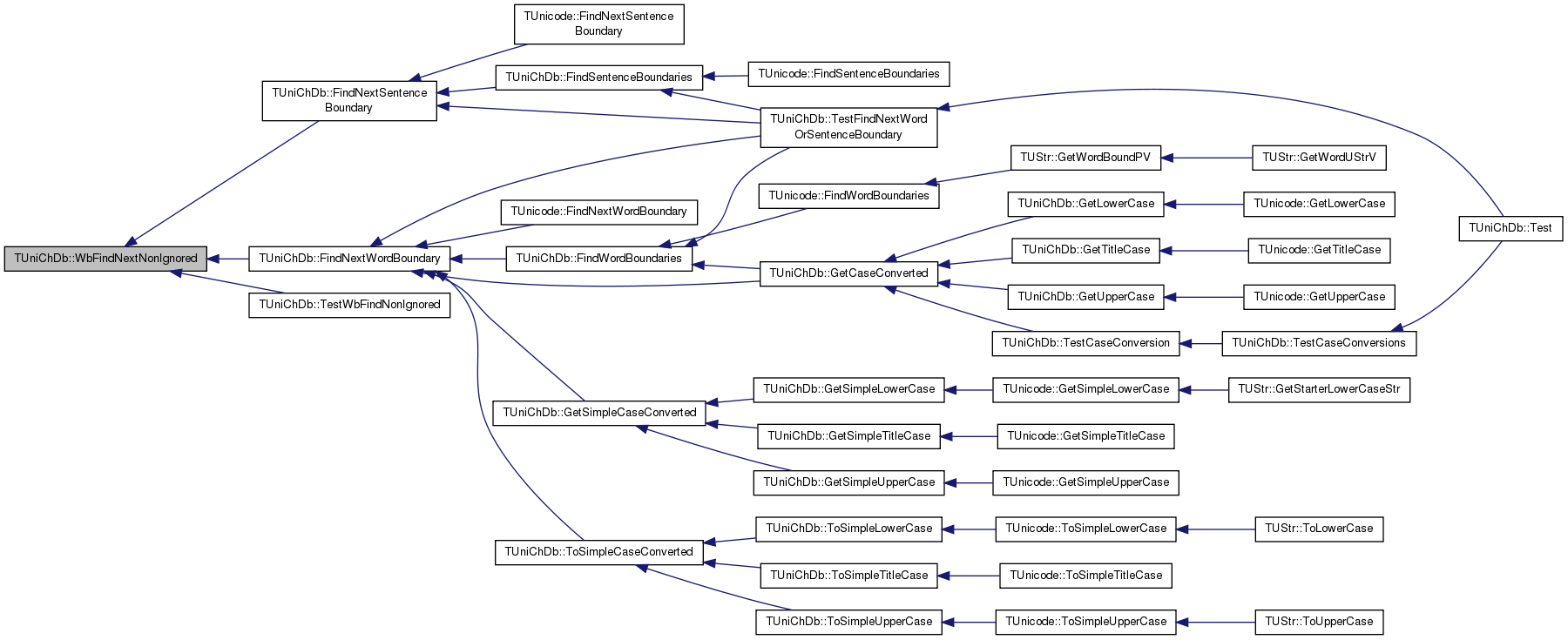
|
inlineprotected |
Definition at line 1429 of file unicode.h.
References IsWbIgnored().

|
inlineprotected |
Definition at line 1434 of file unicode.h.
References IsWbIgnored().
Referenced by CanSentenceEndHere(), FindNextSentenceBoundary(), FindNextWordBoundary(), and TestWbFindNonIgnored().

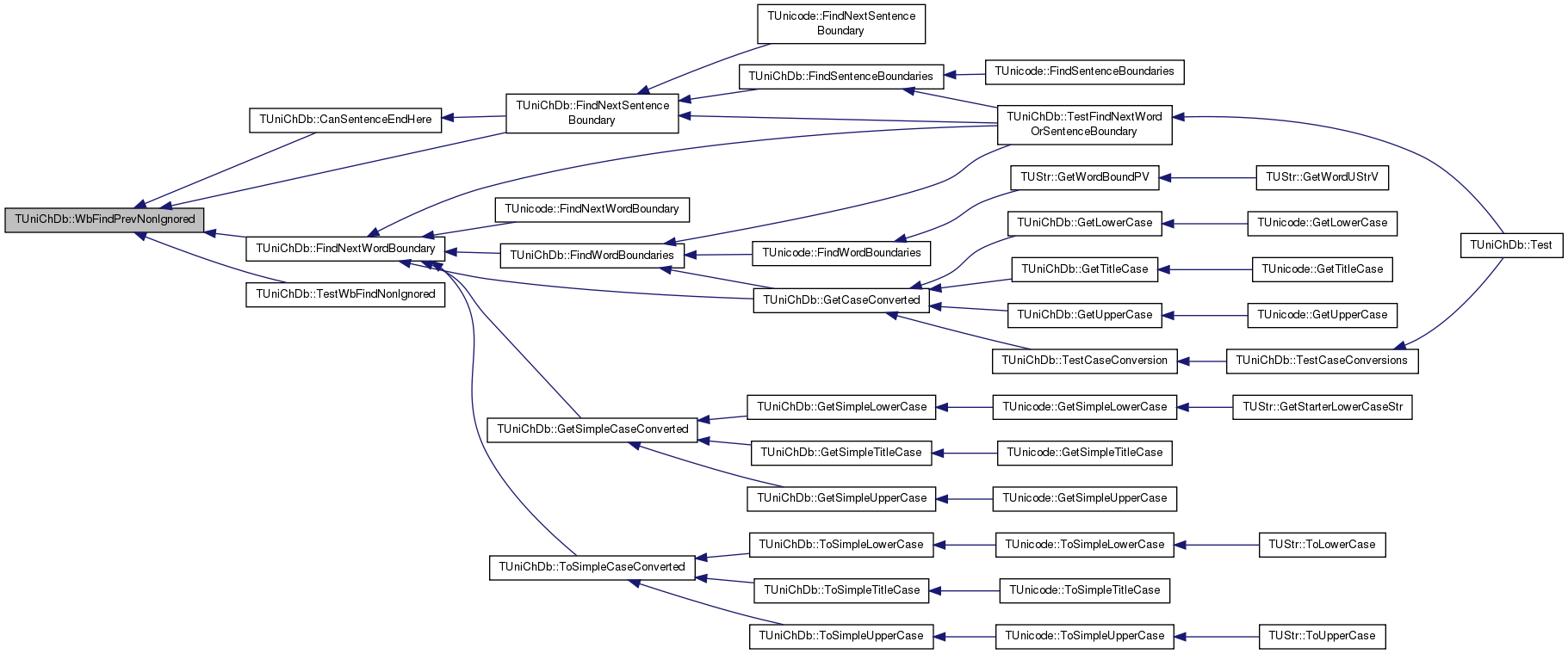
|
friend |
| TUniCaseFolding TUniChDb::caseFolding |
| TStrPool TUniChDb::charNames |
| TIntV TUniChDb::decompositions |
Definition at line 1266 of file unicode.h.
Referenced by AddDecomposition(), LoadTxt(), and LoadTxt_ProcessDecomposition().
| THash<TInt, TUniChInfo> TUniChDb::h |
Definition at line 1263 of file unicode.h.
Referenced by AddDecomposition(), GetCaseConverted(), GetSimpleCaseConverted(), InitDerivedCoreProperties(), InitLineBreaks(), InitPropList(), InitScripts(), InitWordAndSentenceBoundaryFlags(), LoadTxt(), TUniChDb::TSubcatHelper::SetCat(), TUniChDb::TSubcatHelper::TestCat(), TestComposition(), TestWbFindNonIgnored(), and ToSimpleCaseConverted().
Definition at line 1461 of file unicode.h.
Referenced by CanSentenceEndHere().
| TStrIntH TUniChDb::scripts |
Definition at line 1265 of file unicode.h.
Referenced by InitScripts().
| int TUniChDb::scriptUnknown |
Definition at line 1272 of file unicode.h.
Referenced by GetScript(), InitAfterLoad(), and LoadTxt().
| TIntIntVH TUniChDb::specialCasingLower |
Definition at line 1271 of file unicode.h.
Referenced by GetCaseConverted(), and InitSpecialCasing().
| TIntIntVH TUniChDb::specialCasingTitle |
Definition at line 1271 of file unicode.h.
Referenced by GetCaseConverted(), and InitSpecialCasing().
| TIntIntVH TUniChDb::specialCasingUpper |
Definition at line 1271 of file unicode.h.
Referenced by GetCaseConverted(), and InitSpecialCasing().